THE MAKING OF DARFURNICA
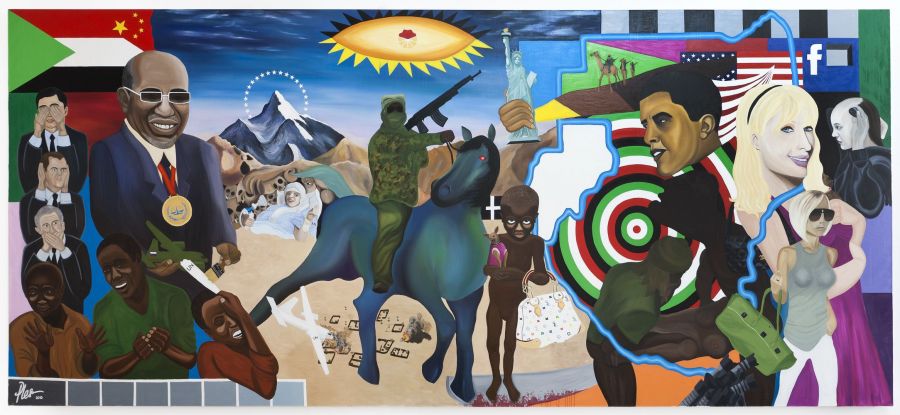
While working on Darfurnica I uploaded pictures of my work after each step. My goal was to capture a specific time period with this painting and the content could change along the way according to what is happening in Darfur and simultaneously in the free world. Although Darfurnica is finished I will not upload the final posts until after the exhibition as I hope to leave a bit of curiosity intact. After the show I will upload all the final posts. Thank you for following the process and for all the enthusiastic suggestions, emails and comments I have received along the way.
Please note that this is not the full process. The final posts will be published shortly.
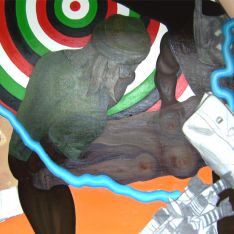
DARFURNICA DAY 53 - JUNE 9, 2010
Today I finished working on the rape scene in Darfurnica. Rape has been used as a cruel weapon throughout the atrocities and numerous women and girls as young as four(!) face rape on a daily basis in Darfur. Usually it is not even the act by a single man, but gang rapes. Besides the physical and emotional pain after such a horrific experience the women also risk facing social problems within their families and communities as they are considered “unclean”.
Aid workers says that 100% of the women in camps in Darfur face gender-based abuse. 100%!!! And of course, the Sudanese government claim that there is no rape at all.
CNN brought the following report from the Zam Zam displacement camp in Sudan:
Sudan's Darfur crisis has exploded on many fronts -- violence, hunger, displacement and looting -- but United Nations peacekeepers say the biggest issue now affecting the region is the systematic rape of women and children.
Thousands of women as young as 4 caught in the middle of the struggle between rebel forces and government-backed militias have become victims of rape, they say, with some aid groups claiming that it is being used as a weapon of ethnic cleansing. "That is one of the biggest issues in Darfur: the rapes, and crimes against women and children," said Micheal Fryer, police commissioner of UNAMID, the United Nations peacekeeping force deployed to try to tackle the violence.
Relief workers say they are powerless to stop the attacks and say that if they do speak out, they fear that the Sudanese government will tell them to leave the country. Humanitarian group Refugees International said in a report last year that rape was "an integral part of the pattern of violence that the government of Sudan is inflicting upon the targeted ethnic groups in Darfur."
Some relief workers say that almost every woman living in aid camps has been raped or become a victim of gender-based violence. Many teenagers, while out running errands such as collecting firewood, are raped multiple times by militiamen, the workers say. They say the situation has now become so bad that many women are now resigned to rape as a way of life and men are unwilling to accompany them because they fear that they will be killed if they try to defend them. But despite the extent of the abuse, the Sudanese government insists there is no problem, adding to the difficulties faced by the victims, who are often ostracized by their communities or fall afoul of a legal system seen as favoring their attackers. "There is no rape in Darfur," said Mohammad Hassan Awad, a Humanitarian Aid Commissioner for West Darfur, who accuses foreign aid workers of persuading people in refugee camps to make false claims. Although few aid workers dispute the extent of the attacks against women, they say survivors are unwilling to come forward. But those who do reveal shocking levels of abuse. "She said they removed their scarves and used it to tie them up and were taking turns to rape them. One is 13 years old; the other one is 16 years," Ajayi Funmi of the UNAMID police, who is trying to educate women, said after talking to two girls. Making matters worse, aid workers say scores of babies conceived through rape are being dumped by their mothers. "Abandoned babies are reported, but because of the stigma attached to it, there is no detailed report, because the women don't come forward," said Dr Naqib Safi of the U.N. children's body UNICEF.
As many as 20 babies a month are being dumped in one camp of 22,000 people. With U.N. officials calling for more female officers to better educate women against rape and women saying they won't feel safe until the under-equipped and undermanned United Nations force is strong enough to protect them, the situation shows little sign of improving.
I can't even imagine the lives of these brave women and the situations they have to face every single day. As long as so many people are living in camps under these conditions I will continue to work as hard as I can to spread the word and try to use my art to get focus on Darfur. It is simply unacceptable.
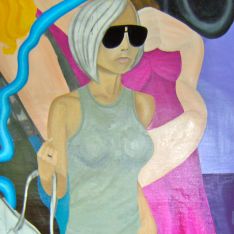
DARFURNICA DAY 52 - JUNE 7, 2010
Violence in Darfur claimed almost 600 lives in May, more than any other month since U.N. peacekeepers arrived in 2008.
Dictator Omar al-Bashir claimed victory in Sudan's fraudulent elections in April. While the world has looked away, he has been emboldened in his efforts to crack down on all who oppose him. As the Save Darfur Coalition continues to report, The REAL results of the election are harassment and imprisonment of Bashir's critics, more clashes between rebel groups and the government, new aerial bombing over Darfur, and rising civilian casualties.
At this moment, 4,9 million Sudanese are displaced
Sudan has the highest displacement rate in the world – yet protection of these civilians and the humanitarian workers who assist them is lackluster at best. In Darfur, Janjaweed, rebel groups, and bandits endanger communities. Aid workers are kidnapped. Women and children are terrorized by sexual assault and forced marriages.
I read the following from AFP on Save Darfur's website: The surge in violence follows the breakdown of peace talks between Darfur's main rebel group and the Khartoum government and contradicts an August pronouncement by the former chief of the UN-AU force's military operations, Martin Agwai, that the civil war is over.
"The parties to a much-applauded Framework (peace) Agreement (in February) could now be defined as 'belligerents' and it is not anticipated they will convene peacefully in the short term," said the confidential document. It said 440 people died in fighting last month between Darfur rebels and government forces, 126 in tribal violence, and 31 in other violence, including murder. In May, fighting broke out anew between the Justice and Equality Movement, Darfur's main rebel group, and the government after the JEM walked out of peace talks in the Qatari capital Doha.
The document of the hybrid UN-African Union Mission in Darfur (UNAMID) did not give a breakdown of the two sides' losses. The failure of the February agreement between Khartoum and JEM "culminated in military confrontations leaving in its wake the biggest number of fatalities ever recorded in a single month: 597," including the tribal deaths, it said. Two rival Arab tribes, the Rezeigat and Misseriya, have also clashed in Darfur since March. Darfur, an arid desert region the size of France, has been gripped by a civil war since 2003 that has killed 300,000 people and displaced another 2.7 million, according to UN figures. Khartoum says 10,000 people have died. UNAMID was deployed in January 2008.
Last month, Sudanese army forces dislodged JEM rebels from their Jebel Moon stronghold in West Darfur on the border with Chad, through which the JEM had previously been supplied before support from Ndjamena was cut off. "JEM's ability to move from Jebel Moon to locations including el-Daein, Adila, Umm Sauna, Abu Darmilla -- and Babanosa in Southern Kordofan, possibly a current headquarters -- confirms the extent of their knowledge of the terrain," the document said. "More importantly this suggests some local support along the way," it said, whereas the government's authority was being restricted to the towns of Darfur. The document voiced concern over human rights abuses against civilians, a "total lack of humanitarian access to conflict-affected areas," and "indications that the already tense situation is likely to escalate further."
On Monday in Doha, the Sudanese government resumed peace talks with a minor rebel group in Qatar's capital, in the absence of JEM. Sudan's chief negotiator Amin Hasan Omar said Khartoum was "optimistic" about signing a final agreement with the Liberation and Justice Movement, a rebel group that is an alliance of splinter factions.
Meanwhile, Qatari mediator and minister of state for foreign affairs, Ahmad Abdullah al-Mahmud, called on other rebel groups to join in the negotiations. JEM had signed the framework accord in February that was hailed by the international community as a major step toward bringing peace to the region devastated by seven years of war. But there was no final, comprehensive peace agreement by a March 15 deadline and JEM broke off from the talks that same month, claiming ceasefire violations and resumed attacking government forces.

DARFURNICA DAY 51 - MAY 28, 2010
Today I read this comment by Andrew Romanoff (Candidate for US Senate) in The Huffington Post:
Re-election of al-Bashir in Sudan a Travesty
Amid boycotts, allegations of fraud, deadly violence, and a civil war, Omar al-Bashir was sworn in for another five-year term as the President of Sudan yesterday. Throughout al-Bashir's presidency, hundreds of thousands were killed and millions displaced from Darfur, and the International Criminal Court has issued an arrest warrant for the President alleging war crimes and crimes against humanity.
The U.N. estimates the humanitarian crisis in Darfur is the worst in the world today. President Omar al-Bashir's re-election is a travesty and a reminder that we must not leave this crisis in the shadows of history.
As Speaker of the Colorado State House, I sponsored HB07-1184 requiring the state to divest funds from companies with ties to al-Bashir's regime. Further, I traveled to China to meet with officials about Sudan and human rights abuses. As U.S. Senator, I will continue my efforts to shed light on the horrors in Darfur and make the first genocide of the 21st century the last.
I applaud Andrew Romanoff's intentions to step up for the people in Darfur and I hope he keeps his word if he is elected. Many politicians have stated the importance of help for Darfur and their personal engagement, unfortunately, the words are not always followed by actions.
Some people disregard Sudan after the saddening elections with Omar al-Bashir as the winner because they say that the people of Sudan voted for him, so there is no need to help them. However, if you follow the reports from aid groups inside Sudan you will quickly learn how corrupt, violent and undemocratic the elections were. It is hard to comprehend how a person charged with genocide can even run for presidency in the 21st century. We can not sit by and KNOW how he harms so many people in Sudan. We must all continue to stand up for Sudan, acknowledge what is happening and pressure our politicians to make the people of Sudan a priority. Every basic human right that we enjoy every single day in the west is also a basic human right for the Sudanese population!

DARFURNICA DAY 50 - MAY 17, 2010
Today I finished painting Jade Goody, the English reality star who became famous from Big Brother and later diagnosed with cancer while appearing on the Indian version of Big Brother, Big Boss. As I described in one of my previous posts, her sickness and death in 2009 was closely followed by the tabloids. The death of one celebrity, who interestingly enough was ridiculed by the press until she was diagnosed with cancer, made more headlines than you can imagine.
Every piece of the process was made into a live drama with the western world as audience. This is what the media has become. A never ending source of entertainment no matter the subject. One death can claim all the front covers if it is a famous person with an entertaining story. First ever cancer on Bog Brother - great! And while the media feeds us headlines like GET ME OUT OF THIS PAIN - Jade's agony in cancer op dash, thousands of people are brutally murdered in Darfur without being mentioned with a single word.
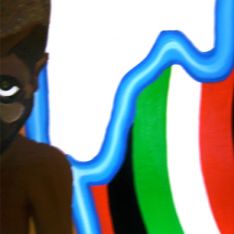
DARFURNICA DAY 49 - MAY 15, 2010
Darfurnica is really starting to come together now. It feels a bit surreal that this gigantic painting which started out as a dream is now actually here in front of me and almost finished. I am very excited about putting my exhibition together in Copenhagen and can't wait to open the show. Most of the people I know had never heard some of the stories I have painted in Darfurnica. For example, the fact that Sudan's president Omar al-Bashir had his people paint bombers white and stencil them with the UN logo before bombing villages in Darfur – leaving the people there thinking that help was coming only to realize the opposite. The cruelty in the actions of the government in Sudan is something that shouldn't be left unspoken.
Together with Darfurnica my show consists of 400 drawn portraits. I call itFORBES/DARFUR 09.
Every year the American Forbes Magazine lists the 100 most influential people based on wealth, exposure, television appearance etc. The repetition of the images of these people helps “training” the viewers to respond to any kind of news about them, news that fill up bigger and bigger parts of the serious medias.
I have made 3 portraits of each celebrity on the Forbes list to illustrate the element of repetition and then I have made 100 portraits of the LEAST influential people in 2009, represented by 100 children in refugee camps in Darfur. I believe that their situation would be different if their reality and the urgency for the surrounding community to react was repeated in the same way.
When my show starts I will seduce my viewers to take a look at these children while they look at the rich and famous.
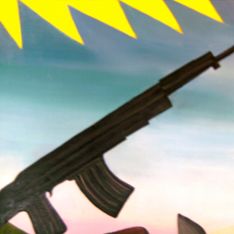
DARFURNICA DAY 48 - MAY 9, 2010
A month ago I read this very important article by Sean Brooks in The New Republic:
Already Stolen - A visit to Sudan makes clear: The election is going to be a sham
In February, as part of a delegation from the Save Darfur Coalition, I met Mustafa Ismail in Khartoum. Ismail is the country’s former foreign minister and current presidential adviser to President Omar Al Bashir. He thanked us for our “timely visit,” then proceeded to speak almost uninterrupted for close to an hour about the Sudanese regime’s new commitment to democracy, peace, and development. To that end, he urged the international community to endorse the country’s upcoming nationwide elections and stop “inflaming” the situation in Sudan with false accusations.
Now, with the Sudanese vote set to begin this weekend, the Obama administration seems to be doing exactly what Ismail had wanted. Last month, Scott Gration, the U.S. special envoy to Sudan, said that “significant preparations have been made to ensure that the elections will really reflect the will of the people” (although he added that there were “logistical challenges” still to resolve). Then, last weekend—after the presidential candidate of the Sudan People’s Liberation Movement (SPLM), the major party that represents southern Sudan, withdrew from the race, citing the prospect of massive fraud and intimidation—Gration said that members of Sudan’s electoral commission had “given [him] confidence that the elections … would be as free and as fair as possible,” adding that they “have gone to great lengths to ensure that the people of Sudan will have access to polling places and that the procedures and processes will ensure transparency.”
Gration’s optimism is baffling. As I learned during my recent four-week trip to Sudan—when I visited Khartoum, the southern part of the country, and Darfur—there is no chance that these elections will be even remotely free or fair. For one thing, the government has been harassing its opponents for months. Three weeks ago, an 18-year-old activist associated with the youth group Girifna—“We are fed up” in Arabic—said that he had been kidnapped and tortured by government agents. This followed the arrest in early March of three Girifna members who had been taking part in a voter mobilization effort sponsored by the group. Another youth activist has said he was kidnapped and tortured by national intelligence agents back in December. That month, three leading members of the SPLM were briefly arrested. And, on the same day in February when I met Ismail and heard his protestations about the regime’s commitment to democracy, a Darfuri student activist named Mohamed Musa was abducted from the University of Khartoum; he was later found dead. (While no one knows for sure who killed him, the government behaved oddly in the wake of his death—detaining his father at the airport in Khartoum, for instance—and many suspect the Sudanese security services were responsible for the murder.)
It is true that Sudan is not a totalitarian state like North Korea or Burma, and the aftermath of Musa’s death in some ways demonstrated—in the words of one leading opposition figure—the “margin of freedom” available to political parties in advance of these elections. More than 1,000 Darfuris and other Sudanese protested as part of the funeral proceedings in Khartoum (albeit under the watchful eye of what one attendee said were over 700 security forces and 30 trucks with heavy artillery mounted on the back). An opposition leader attended the funeral and hailed Musa as “one of our martyrs.” The next day, a few papers even covered the story.
But there is a catch—and it is this catch that makes Gration’s optimism look truly ridiculous: While some political space has opened in the country’s northern and southern states over the past few years, things are quite different in Darfur to the west. There, politics of even the narrow variety remain generally impossible, as sporadic violence against civilians continues and a general atmosphere of intimidation prevails.
The official campaign season had just begon during the week I spent in the three state capitals of Darfur. But the region remains under a state of emergency and heavily militarized: Checkpoints restrict most travel outside of the three major cities, and, around the time I arrived, the government launched an offensive against rebels in the mountainous area of Jebel Marra. An estimated 100,000 people were displaced by the fighting. Every opposition party member I spoke to in Sudan mentioned how the state of emergency severely constrains campaigning in Darfur. What is legal or illegal changes by the day and the mood of the nearest group of men with guns and pickup trucks. The omnipresence of uniformed men throughout the region makes a recent recommendation from the Carter Center—one of the international organizations in charge of election monitoring—to the Sudanese government seem completely disconnected from reality. What, exactly, would it mean for the regime to “take all necessary steps to avoid the unnecessary militarization of polling stations” when all of Darfur remains firmly in the hands of either the state security apparatus or rebel movements?
Not surprisingly, during my time in Darfur, I saw only a few opposition campaign posters amid a sea of pro-government propaganda. I heard about the recent detention and harassment of political leaders and human rights activists by government officials. One night in a private home, I listened to female opposition politicians and human rights activists speak about their suspicion that security agents will target those who campaign or vote against Bashir’s party. As the curfew of 10 p.m. drew near, they rushed through a litany of electoral and human rights violations—including the closure of opposition party meetings and the detention of opposition party members. Finishing the meeting, one woman warned, “Darfur is a time-bomb about to go off.”
In Khartoum, a leading columnist spoke about being forced from a newspaper because of a recent article he wrote on Darfur that was critical of the government’s policies. The former prime minister, Sadiq Al Mahdi, told me that he and his party could not pass up this opportunity to change the government and therefore were fielding candidates nationwide, including in Darfur; but, two weeks later, state radio refused to air a campaign speech in which he referenced the International Criminal Court’s outstanding arrest warrant for Bashir—an arrest warrant that was obviously quite popular in Darfur. (Two days ago, Al Mahdi announced that his party would now boycott the elections.)
No wonder that a senior peacekeeping official in Nyala—Darfur’s largest city—told me that the majority of Darfuris are not interested in the upcoming vote. The more than two million displaced people in camps generally boycotted the registration process. Sitting under a tent in one camp in West Darfur with a group of almost twenty sheikhs, I asked about the upcoming elections. One of them shook his head and declared that there were no candidates on the ballot who represented their interests. The whole process, he said, makes us “feel like we don’t belong to this country.”
In all likelihood, Bashir’s government will soon declare victory in the elections. It will ask the world to believe that, despite a decades-long record of genocide and repression, it has earned a mandate from the people it governs. Perhaps the world and the Obama administration—desperate for some sign of progress in Sudan—will choose to believe it.
This would be a major mistake. Whatever the outcome, the elections are almost certain to leave Darfuris excluded from the politics of Sudan. More than two million of them will still live in displaced persons camps, unable to return home. Meanwhile, even in the relatively freer parts of the country, the harassment, intimidation, and torture of activists and political opponents is sure to continue. Should there be an outcry by these reformers after the election—something along the lines of what happened after last June’s election in Iran—the Obama administration must be prepared to stand with them. And under no circumstances should it legitimize what is guaranteed to be a deeply un-democratic vote.
I am truly experiencing the corruption Brooks describes in my own mission to get medical equipment to Darfur. The "battle" in Port Sudan has lasted more than 5 months and as soon as there is any kind of closure I will share all my experiences with you. The process has been insane and describes very well the struggle that the people in Darfur have to go through to receive help from outside and the impossible demands you meet when you try to get the help into the country.
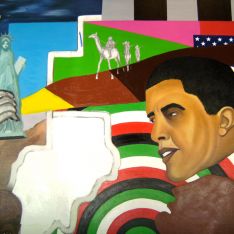
DARFURNICA DAY 47 - MAY 6, 2010
From the Save Darfur Coalition:
The election results are in: Musa Hilal, the poster child for Janjaweed atrocities in Darfur, has been declared the winner of a seat in Parliament. It's hard to imagine: the top commander of government-backed Janjaweed militias, responsible for numerous atrocities in Darfur in 2003 and 2004, will be representing Darfur in Sudan's Parliament.
Save Darfur, the Enough Project, and other partners have released a report card on the Obama administration's progress on Sudan. On 17 of 28 indicators the situation on the ground has worsened, on 11 other measures there has been no change in the past six months. One of the key indicators - the recent elections in Sudan - was marred by fraud, censorship, and voter intimidation. Now the regime in Khartoum is certifying as winners candidates like Janjaweed leader Musa Hilal - who should have never been allowed to run for office.
We need President Obama, Secretary of State Hillary Clinton and Ambassador to the U.N. Susan Rice to all personally step up and make sure that the regime in Khartoum is held accountable for a lack of progress towards peace. Six months ago, the Obama administration outlined its new strategy for Sudan which called for significant consequences for the Bashir regime if there was no progress towards peace.
As President Obama stated, "If the Government of Sudan acts to improve the situation on the ground and to advance peace, there will be incentives; if it does not, then there will be increased pressure imposed by the United States and the international community.
DARFURNICA DAY 46 - APRIL 23, 2010
From the Dave Darfur Coalition:
Despite international demands for free and fair elections, indicted war criminal Omar al-Bashir is preparing to claim victory in what you and I both know was a rigged vote. If Bashir's "victory" is recognized by the international community, it will only embolden the regime in Khartoum and deal a serious blow to the peace process.
You raised your voice with 70,000 other activists, and Assistant Secretary of State P.J. Crowley has already declared that "this was not a free and fair election," adding that, "to the extent that the Government of Sudan was looking for redemption or legitimacy in what happened here, they will get none of it." While much of the world is prepared to accept this sham election and just move on, we must not abandon the people of Sudan who have put themselves at great personal risk to stand up for democracy and basic freedoms.
We must continue to raise our voices for all of those who did not have a chance to speak out during this fraudulent election. For the university student who was harassed and murdered after speaking out against the government. For the election observers who were kidnapped and beaten. For the thousands of Darfuris who continue to live in squalid camps and didn't have the opportunity to participate. For them, we must continue to insist that the international community pressure the government in Khartoum to fulfill its obligation under the Comprehensive Peace Agreement (CPA) to provide for a democratic transformation of the country.
These elections should have been the first chance in more than two decades for millions of Sudanese to freely choose their leaders. Instead, the Sudanese government ensured that a lack of political freedoms and a continued crisis in Darfur eliminated that opportunity.
If the government of Sudan continues to inhibit basic political rights and freedoms, the stage will be set for widespread violence during the referendum on southern succession. If civil war is to be avoided, both the governments of North and South Sudan must recommit themselves to protecting personal liberty and freedom in order for the referendum to be credible. These are not just lofty ideals – they are obligations that both parties agreed upon in the CPA. As a guarantor of the CPA, it is the responsibility of the United States to hold those who presided over fraudulent elections accountable and take all steps to further democracy in Sudan and protect the integrity of the 2011 referendum.
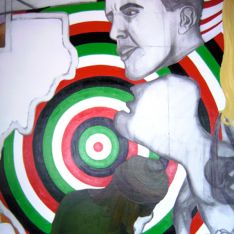
DARFURNICA DAY 45 - APRIL 20, 2010
From the Save Darfur Coalition:
Over the last twenty-four hours, the American government response to elections in Sudan has begun to take shape. Yesterday morning, the United States with the United Kingdom and Norway issued a joint statement commending the Sudanese people "for their engagement in a complex and lengthy polling process, and their increased civic participation over recent months." The members of the Troika, however, noted the "initial assessments of the electoral process from independent observers, including the judgment that the elections failed to meet international standards." As such, they called on the National Elections Commission "to address in good faith any legitimate disputes effectively and impartially."
Later in the day, State Department spokesperson P.J. Crowley went further asserting, "This was not a free and fair election. It did not, broadly speaking, meet international standards. That's been clear in the comments that have been done by the Carter Center, the EU, and the AU over the past couple of days. That said, I think we recognize that the election is a very important step in terms of implementation of the CPA ... So while we understand that there were flaws and failures in terms of this electoral process, we still recognize that there's a lot of work to be done."
Then this morning, the Office of the White House Press Secretary issued a statement that reiterated these points and also looked forward. It asserted that the United States would continue to work with all parties in Sudan and, that, "In the months and years ahead it will be critical to continue pressing for progress for the civil and political rights of all of the Sudanese people. This priority will not expire with the CPA, and all parties should draw on this experience to improve preparations for future elections and referenda... The United States also remains committed to working with the international community to support implementation of outstanding elements of the CPA and ensure that the referendum happens on time and that its results are respected. With partners in the region and beyond, we will continue to engage in the preparations necessary to support peace and stability after the 2011 referenda, and continue to promote peace, security, and accountability in Darfur."

DARFURNICA DAY 44 - APRIL 15, 2010
From the Save Darfur Coalition:
On the last of five days of polling in Sudan, reports from across the country continued to document technical problems, electoral irregularities, and unfortunately violence and intimidation.
News was dominated by reports that nine members of Sudanese President Omar Al Bashir's National Congress Party (NCP) were killed in South Sudan three days ago. The NCP blamed the Sudan People's Liberation Army - but SPLA leaders denied the violence was coordinated and described the incident as an isolated, individual crime by one of its soldiers. In other news, the youth movement Girifna reported on its website that two of its members had been detained in Khartoum yesterday. The Committee to Protect Journalists called on the Sudanese authorities to immediately drop criminal charges against prominent journalist and opposition party member Al-Haj Ali Warrag. Authorities charged Warrag on Sunday with "waging war against the state" in connection with an article that he published on April 6.
The National Election Commission yesterday estimated the voter turnout ranged widely from 63% to 82% in each state, though these figures have been questioned. With polling now complete, all eyes turn to the announcement of results and the reaction of world leaders across the globe. Vote counting will begin tomorrow and the National Elections Commission plans to begin releasing results next Tuesday, April 20. Many Sudanese fear the possibility of post-election violence.
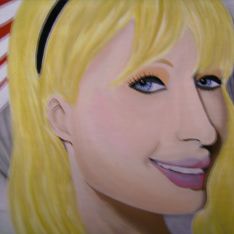
DARFURNICA DAY 43 - APRIL 12, 2010
From the Save Darfur Coalition:
In response to calls from the Sudanese People's Liberation Movement (SPLM) and other parties, the National Electoral Commission (NEC) agreed to extend the voting period an extra two days - so voting will now conclude on Thursday, April 15th. The SPLM had requested a four-day extension over concerns that the first day of voting was a "wasted day" due to logistical and electoral challenges, which led the NEC to acknowledge "mistakes."
The second day of voting in Sudan proceeded much as the first, although reports indicated it was somewhat more organized. Fuller reports came out about the depth of the difficulties facing voters and the electoral process, including ballots arriving late to polling stations; insufficient numbers of ballots; polling stations opening late; typographical errors or omissions on ballots; incorrect party symbols on ballots; missing names on voter registration lists; political parties unable to monitor voting in some locations; same-day registration of voters (which is illegal); and problems with the ink designed to prevent voters from voting multiple times.
Shamseddin Dawalbeit, the deputy head of Tamam, an alliance of more than 100 civil society groups monitoring the polls said, "it's quite clear that these violations were very serious ones . . . these violations are being repeated systematically."
There have been no major reports of violence, although there have been some reported incidents of voter intimidation by security forces.
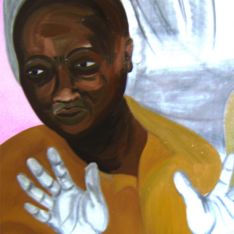
DARFURNICA DAY 42 - APRIL 11, 2010
From the Save Darfur Coalition's newsletter:
After months of speculation and intrigue, polls opened across Sudan on Sunday morning. Many Sudanese turned out to exercise their right to vote, despite the opposition boycotts and precarious security situation. News reports variously described voter turnout as light in south Sudan to surprisingly high in El Fasher in Darfur. President al-Bashir voted, as did the president of the Government of South Sudan, Salva Kiir, who arrived at the scheduled poll opening time only to be told to wait a half hour for the polls to be finished being set up.
As was expected, a number of polling stations opened late, there have been reports of significant confusion about the multiple ballots (8 in the north; 12 in the south); in fact, Salva Kiir is said to have placed one of his ballots in the wrong ballot box. Numerous other logistical challenges have presented themselves, not atypical for an election in a developing nation. Electoral irregularities, particularly problems with the voter lists have been widely reported. There have been no major reports of significant or organized violence thus far.
Meanwhile, President Jimmy Carter, leading the Carter Center's election observation mission warned that "if some violence or disruption occurs here in Sudan it might very well spill over into a large part of Africa." Asked what specifically could trigger such a conflict, Carter answered: "I think a breakdown in the entire electoral process that results in violence on both sides ... I would say that that could happen only if the process envisioned in the Comprehensive Peace Agreement was disrupted completely which I certainly do not anticipate."
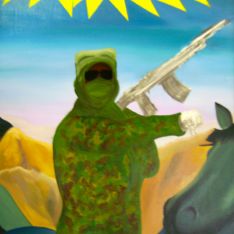
DARFURNICA DAY 41 - APRIL 9, 2010
Today I would like to share the following article from The New Republic, written by Sean Brooks, a policy analyst at the Save Darfur Coalition.
A visit to Sudan makes clear: The election is going to be a sham
In February, as part of a delegation from the Save Darfur Coalition, I met Mustafa Ismail in Khartoum. Ismail is the country’s former foreign minister and current presidential adviser to President Omar Al Bashir. He thanked us for our “timely visit,” then proceeded to speak almost uninterrupted for close to an hour about the Sudanese regime’s new commitment to democracy, peace, and development. To that end, he urged the international community to endorse the country’s upcoming nationwide elections and stop “inflaming” the situation in Sudan with false accusations.
Now, with the Sudanese vote set to begin this weekend, the Obama administration seems to be doing exactly what Ismail had wanted. Last month, Scott Gration, the U.S. special envoy to Sudan, said that “significant preparations have been made to ensure that the elections will really reflect the will of the people” (although he added that there were “logistical challenges” still to resolve). Then, last weekend—after the presidential candidate of the Sudan People’s Liberation Movement (SPLM), the major party that represents southern Sudan, withdrew from the race, citing the prospect of massive fraud and intimidation—Gration said that members of Sudan’s electoral commission had “given [him] confidence that the elections … would be as free and as fair as possible,” adding that they “have gone to great lengths to ensure that the people of Sudan will have access to polling places and that the procedures and processes will ensure transparency.”
Gration’s optimism is baffling. As I learned during my recent four-week trip to Sudan—when I visited Khartoum, the southern part of the country, and Darfur—there is no chance that these elections will be even remotely free or fair. For one thing, the government has been harassing its opponents for months. Three weeks ago, an 18-year-old activist associated with the youth group Girifna—“We are fed up” in Arabic—said that he had been kidnapped and tortured by government agents. This followed the arrest in early March of three Girifna members who had been taking part in a voter mobilization effort sponsored by the group. Another youth activist has said he was kidnapped and tortured by national intelligence agents back in December. That month, three leading members of the SPLM were briefly arrested. And, on the same day in February when I met Ismail and heard his protestations about the regime’s commitment to democracy, a Darfuri student activist named Mohamed Musa was abducted from the University of Khartoum; he was later found dead. (While no one knows for sure who killed him, the government behaved oddly in the wake of his death—detaining his father at the airport in Khartoum, for instance—and many suspect the Sudanese security services were responsible for the murder.)
It is true that Sudan is not a totalitarian state like North Korea or Burma, and the aftermath of Musa’s death in some ways demonstrated—in the words of one leading opposition figure—the “margin of freedom” available to political parties in advance of these elections. More than 1,000 Darfuris and other Sudanese protested as part of the funeral proceedings in Khartoum (albeit under the watchful eye of what one attendee said were over 700 security forces and 30 trucks with heavy artillery mounted on the back). An opposition leader attended the funeral and hailed Musa as “one of our martyrs.” The next day, a few papers even covered the story.
But there is a catch—and it is this catch that makes Gration’s optimism look truly ridiculous: While some political space has opened in the country’s northern and southern states over the past few years, things are quite different in Darfur to the west. There, politics of even the narrow variety remain generally impossible, as sporadic violence against civilians continues and a general atmosphere of intimidation prevails.
The official campaign season had just begun during the week I spent in the three state capitals of Darfur. But the region remains under a state of emergency and heavily militarized: Checkpoints restrict most travel outside of the three major cities, and, around the time I arrived, the government launched an offensive against rebels in the mountainous area of Jebel Marra. An estimated 100,000 people were displaced by the fighting.
Every opposition party member I spoke to in Sudan mentioned how the state of emergency severely constrains campaigning in Darfur. What is legal or illegal changes by the day and the mood of the nearest group of men with guns and pickup trucks. The omnipresence of uniformed men throughout the region makes a recent recommendation from the Carter Center—one of the international organizations in charge of election monitoring—to the Sudanese government seem completely disconnected from reality. What, exactly, would it mean for the regime to “take all necessary steps to avoid the unnecessary militarization of polling stations” when all of Darfur remains firmly in the hands of either the state security apparatus or rebel movements?
Not surprisingly, during my time in Darfur, I saw only a few opposition campaign posters amid a sea of pro-government propaganda. I heard about the recent detention and harassment of political leaders and human rights activists by government officials. One night in a private home, I listened to female opposition politicians and human rights activists speak about their suspicion that security agents will target those who campaign or vote against Bashir’s party. As the curfew of 10 p.m. drew near, they rushed through a litany of electoral and human rights violations—including the closure of opposition party meetings and the detention of opposition party members. Finishing the meeting, one woman warned, “Darfur is a time-bomb about to go off.”
In Khartoum, a leading columnist spoke about being forced from a newspaper because of a recent article he wrote on Darfur that was critical of the government’s policies. The former prime minister, Sadiq Al Mahdi, told me that he and his party could not pass up this opportunity to change the government and therefore were fielding candidates nationwide, including in Darfur; but, two weeks later, state radio refused to air a campaign speech in which he referenced the International Criminal Court’s outstanding arrest warrant for Bashir—an arrest warrant that was obviously quite popular in Darfur. (Two days ago, Al Mahdi announced that his party would now boycott the elections.)
No wonder that a senior peacekeeping official in Nyala—Darfur’s largest city—told me that the majority of Darfuris are not interested in the upcoming vote. The more than two million displaced people in camps generally boycotted the registration process. Sitting under a tent in one camp in West Darfur with a group of almost twenty sheikhs, I asked about the upcoming elections. One of them shook his head and declared that there were no candidates on the ballot who represented their interests. The whole process, he said, makes us “feel like we don’t belong to this country.”
In all likelihood, Bashir’s government will soon declare victory in the elections. It will ask the world to believe that, despite a decades-long record of genocide and repression, it has earned a mandate from the people it governs. Perhaps the world and the Obama administration—desperate for some sign of progress in Sudan—will choose to believe it.
This would be a major mistake. Whatever the outcome, the elections are almost certain to leave Darfuris excluded from the politics of Sudan. More than two million of them will still live in displaced persons camps, unable to return home. Meanwhile, even in the relatively freer parts of the country, the harassment, intimidation, and torture of activists and political opponents is sure to continue. Should there be an outcry by these reformers after the election—something along the lines of what happened after last June’s election in Iran—the Obama administration must be prepared to stand with them. And under no circumstances should it legitimize what is guaranteed to be a deeply un-democratic vote.
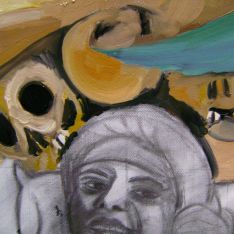
DARFURNICA DAY 40 - APRIL 7, 2010
I want to share the following newsletter from The Save Darfur Coalition:
Beginning Sunday, Sudan will hold multi-party elections for the first time in nearly 25 years, but as we all know: this vote will not be free, fair, or even credible. W
ith your help, we've been working to make sure that the US Government and our international allies don't let Sudan's fraudulent elections legitimize indicted war criminal Omar al-Bashir. That's why we're inviting you to join our Election Alert Network - a group of concerned activists who want to stay informed about next week's vote and take action on behalf of the Sudanese people.
Sign up to receive important alerts about the election in Sudan:
http://action.savedarfur.org/campaign/electionalerts
We will be collecting and analyzing information about the election throughout next week, and will send you regular updates along with the most recent news stories from Sudan.
In the past two weeks, many opposition parties have withdrawn their candidates for President, or have announced they are considering doing so. In addition, many SPLM candidates have withdrawn from north Sudan, including Darfur, at all levels. Just yesterday, the European Union recalled its election monitors from Darfur.
We will keep you updated on developments like this and provide opportunities to take action. No matter what happens during the election, the activist community must be ready to respond. I hope you will sign up for our alerts and take action to help raise awareness about this important moment for the people of Sudan.
Thank you.

DARFURNICA DAY 39 - APRIL 6, 2010
On December 10, 1948 the General Assembly of the United Nations adopted and proclaimed the Universal Declaration of Human Rights. If you are fortunate enough to live a life where all these rights are met, stand up for the people who can't!
Article 1.
All human beings are born free and equal in dignity and rights.They are endowed with reason and conscience and should act towards one another in a spirit of brotherhood.
Article 2.
Everyone is entitled to all the rights and freedoms set forth in this Declaration, without distinction of any kind, such as race, colour, sex, language, religion, political or other opinion, national or social origin, property, birth or other status. Furthermore, no distinction shall be made on the basis of the political, jurisdictional or international status of the country or territory to which a person belongs, whether it be independent, trust, non-self-governing or under any other limitation of sovereignty.
Article 3.
Everyone has the right to life, liberty and security of person.
Article 4.
No one shall be held in slavery or servitude; slavery and the slave trade shall be prohibited in all their forms.
Article 5.
No one shall be subjected to torture or to cruel, inhuman or degrading treatment or punishment.
Article 6.
Everyone has the right to recognition everywhere as a person before the law.
Article 7.
All are equal before the law and are entitled without any discrimination to equal protection of the law. All are entitled to equal protection against any discrimination in violation of this Declaration and against any incitement to such discrimination.
Article 8.
Everyone has the right to an effective remedy by the competent national tribunals for acts violating the fundamental rights granted him by the constitution or by law.
Article 9.
No one shall be subjected to arbitrary arrest, detention or exile.
Article 10.
Everyone is entitled in full equality to a fair and public hearing by an independent and impartial tribunal, in the determination of his rights and obligations and of any criminal charge against him.
Article 11.
(1) Everyone charged with a penal offence has the right to be presumed innocent until proved guilty according to law in a public trial at which he has had all the guarantees necessary for his defence.
(2) No one shall be held guilty of any penal offence on account of any act or omission which did not constitute a penal offence, under national or international law, at the time when it was committed. Nor shall a heavier penalty be imposed than the one that was applicable at the time the penal offence was committed.
Article 12.
No one shall be subjected to arbitrary interference with his privacy, family, home or correspondence, nor to attacks upon his honour and reputation. Everyone has the right to the protection of the law against such interference or attacks.
Article 13.
(1) Everyone has the right to freedom of movement and residence within the borders of each state.
(2) Everyone has the right to leave any country, including his own, and to return to his country.
Article 14.
(1) Everyone has the right to seek and to enjoy in other countries asylum from persecution.
(2) This right may not be invoked in the case of prosecutions genuinely arising from non-political crimes or from acts contrary to the purposes and principles of the United Nations.
Article 15.
(1) Everyone has the right to a nationality.
(2) No one shall be arbitrarily deprived of his nationality nor denied the right to change his nationality.
Article 16.
(1) Men and women of full age, without any limitation due to race, nationality or religion, have the right to marry and to found a family. They are entitled to equal rights as to marriage, during marriage and at its dissolution.
(2) Marriage shall be entered into only with the free and full consent of the intending spouses.
(3) The family is the natural and fundamental group unit of society and is entitled to protection by society and the State.
Article 17.
(1) Everyone has the right to own property alone as well as in association with others.
(2) No one shall be arbitrarily deprived of his property.
Article 18.
Everyone has the right to freedom of thought, conscience and religion; this right includes freedom to change his religion or belief, and freedom, either alone or in community with others and in public or private, to manifest his religion or belief in teaching, practice, worship and observance.
Article 19.
Everyone has the right to freedom of opinion and expression; this right includes freedom to hold opinions without interference and to seek, receive and impart information and ideas through any media and regardless of frontiers.
Article 20.
(1) Everyone has the right to freedom of peaceful assembly and association.
(2) No one may be compelled to belong to an association.
Article 21.
(1) Everyone has the right to take part in the government of his country, directly or through freely chosen representatives.
(2) Everyone has the right of equal access to public service in his country.
(3) The will of the people shall be the basis of the authority of government; this will shall be expressed in periodic and genuine elections which shall be by universal and equal suffrage and shall be held by secret vote or by equivalent free voting procedures.
Article 22.
Everyone, as a member of society, has the right to social security and is entitled to realization, through national effort and international co-operation and in accordance with the organization and resources of each State, of the economic, social and cultural rights indispensable for his dignity and the free development of his personality.
Article 23.
(1) Everyone has the right to work, to free choice of employment, to just and favourable conditions of work and to protection against unemployment.
(2) Everyone, without any discrimination, has the right to equal pay for equal work.
(3) Everyone who works has the right to just and favourable remuneration ensuring for himself and his family an existence worthy of human dignity, and supplemented, if necessary, by other means of social protection.
(4) Everyone has the right to form and to join trade unions for the protection of his interests.
Article 24.
Everyone has the right to rest and leisure, including reasonable limitation of working hours and periodic holidays with pay.
Article 25.
(1) Everyone has the right to a standard of living adequate for the health and well-being of himself and of his family, including food, clothing, housing and medical care and necessary social services, and the right to security in the event of unemployment, sickness, disability, widowhood, old age or other lack of livelihood in circumstances beyond his control.
(2) Motherhood and childhood are entitled to special care and assistance. All children, whether born in or out of wedlock, shall enjoy the same social protection.
Article 26.
(1) Everyone has the right to education. Education shall be free, at least in the elementary and fundamental stages. Elementary education shall be compulsory. Technical and professional education shall be made generally available and higher education shall be equally accessible to all on the basis of merit.
(2) Education shall be directed to the full development of the human personality and to the strengthening of respect for human rights and fundamental freedoms. It shall promote understanding, tolerance and friendship among all nations, racial or religious groups, and shall further the activities of the United Nations for the maintenance of peace.
(3) Parents have a prior right to choose the kind of education that shall be given to their children.
Article 27.
(1) Everyone has the right freely to participate in the cultural life of the community, to enjoy the arts and to share in scientific advancement and its benefits.
(2) Everyone has the right to the protection of the moral and material interests resulting from any scientific, literary or artistic production of which he is the author.
Article 28.
Everyone is entitled to a social and international order in which the rights and freedoms set forth in this Declaration can be fully realized.
Article 29.
(1) Everyone has duties to the community in which alone the free and full development of his personality is possible.
(2) In the exercise of his rights and freedoms, everyone shall be subject only to such limitations as are determined by law solely for the purpose of securing due recognition and respect for the rights and freedoms of others and of meeting the just requirements of morality, public order and the general welfare in a democratic society.
(3) These rights and freedoms may in no case be exercised contrary to the purposes and principles of the United Nations.
Article 30.
Nothing in this Declaration may be interpreted as implying for any State, group or person any right to engage in any activity or to perform any act aimed at the destruction of any of the rights and freedoms set forth herein.
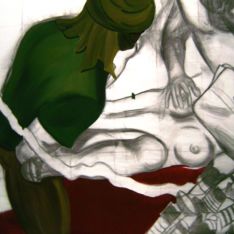
DARFURNICA DAY 38 - APRIL 5, 2010
In the book Not On Our Watch, which inspired me to get involved with Darfur, I read the following:
Each year, the nightly newscast of ABC, CBS and NBC devote a total of roughly 25,000 minutes to news. Nonetheless, for the entire year of 2004, as genocide was ramping up in Darfur, the three main networks' nightly newscasts dedicated only 26 minutes to the conflict, according to the Tyndall Report Year in Review.
During June 2005, a full two years into the Darfur crisis, NBC aired a mere five segments on the genocide, and CBS had none, according to a study by the Be A Witness campaign. It analyzed network and cable news coverage of the Darfur crisis and revealed what many Americans had long suspected about modern corporate media – it is sensationalistic and obsessed with the trivial at the expense of serious news developments like genocide. During that same June 2005 period, NBC and CBS each aired well over three hundred reports on Tom Cruise's romantic relationship with actress Katie Holmes and well over five hundred stories on the Michael Jackson trial. FOX News had forty-one pieces on Sudan, but an astonishing 1,753 stories dedicated to the dethroned King of Pop, Mr. Jackson. In all, the top television news teams aired sixty-five times more segments on what amounts to celebrity gossip than on the genocide in Sudan. The Be A Witness campaign encouraged viewers to send letters and petition ABC, NBC, CBS and FOX News to further cover the unfolding genocide in Darfur. The networks need to be treated much the same as politicians; they need to hear from their constituents (viewers) in order to make something a priority.
People cannot be expected to care about or act upon something they are unaware of. As these numbers attest, it is not enough to assume the mainstream news media will reach the greatest number of citizens or that they will convey the urgency of a situation. From the smallest gestures, such as talking with a friend, to larger-scale efforts, such as sponsoring a public forum, raising awareness is the key to ending the crisis. It is the first, critical step to effective change.
Even though the given statistics are a few years old, it is clear that nothing has changed and that the mainstream media works exactly the same in Europe as in the US.
Lately, Tiger Woods' infidelity has been considered breaking news and covered in a way that makes you think that his personal matters is a truly important matter for all of us. And while the huge networks in America spent countless hours on trashing Michael Jackson in 2005, the same networks have now been spending an equal amount of hours praising him after his death. Very hypocritical if you ask me.
When my Simple Living campaign reached the highest point it was also on FOX News and ABC News. It is unbelievable that genocide is only considered a good story if it can be told through brands and celebrities.

DARFURNICA DAY 37 - APRIL 4, 2010
Two days ago I received the following newsletter from the Save Darfur Coalition:
Late last night, the largest opposition party in Sudan (the southern based Sudanese People's Liberation Movement) announced it was withdrawing its candidate for president of Sudan from the national elections scheduled for April 11-13. The leaders of SPLM did so reportedly because they were convinced that elections were too flawed to move forward and they did not want to legitimize a process that led to the re-election of President Omar-al Bashir, the architect of the Darfur genocide.
This morning, the remaining major opposition parties (with one exception) followed suit and withdrew their candidates from the presidential ballot. Save Darfur has long said that we do not believe free and fair elections are possible in Sudan given the oppressive political environment that has preceded them. And in the last two days, the decisions by the major opposition parties to withdraw underscore that fact.
We have called on President Obama not to legitimize the results of a fraudulent poll and, now that President Bashir's challengers have determined the process is too damaged for there to be a real contest, it is more imperative than ever that President Obama rejects the results of the presidential election as fixed. Please, forward this message to your friends and family asking them to join you in urging President Obama to refuse to legitimize this genocidal regime by clicking the
link below:
http://action.savedarfur.org/campaign/sudanelections/
Thank you for standing with the people of Sudan.
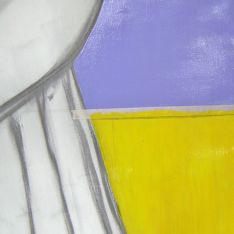
DARFURNICA DAY 36 - APRIL 3, 2010
In Malcolm Gladwell's book, The Tipping Point, he presents interesting ideas about what it takes for people to help each other:
It isn't just prosaic factors like the weather that influence behavior. Even the smallest and subtlest and most unexpected of factors can affect the way we act. One of the most infamous incidents in New York City history, for example, was the 1964 stabbing death of a young Queens woman by the name of Kitty Genovese. Genovese was chased by her assailant and attacked three times on the street, over the course of half an hour, as thirty-eight of her neighbors watched from their windows. During that time, however, none of the thirty-eight witnesses called the police. The case provoked rounds of self-recrimination. It became symbolic of the cold and dehumanizing effects of urban life. Abe Rosenthal, who would later become editor of the New York Times, wrote in a book about the case:
Nobody can say why the thirty-eight did not lift the phone while Miss Genovese was being attacked, since they cannot say themselves. It can be assumed, however, that their apathy was indeed one of the big-city variety. It is almost a matter of psychological survival, if one is surrounded and pressed by millions of people, to prevent them from constantly impinging on you, and the only way to do this is to ignore them as often as possible. Indifference to one's neighbor and his troubles is a conditional reflex in life in New York as it is in other big cities.
This is the kind of environmental explanation that makes intuitive sense to us. The anonymity and alienation of big-city life makes people hard and unfeeling. The truth about Genovese, however, turns out to be a little more complicated – and more interesting. Two New York City psychologists – Bibb Latane of Columbia University and John Darley of New York University – subsequently conducted a series of studies to try and understand what they dubbed the “bystander problem”. They staged emergencies of one kind or another in different situations in order to see who would come and help. What they found, surprisingly, was that the one factor above all else that predicted helping behavior was how many witnesses there were to the event.
In one experiment, for example, Latane and Darley had a student alone in a room stage an epileptic fit. When there was just one person next door, listening, that person rushed to the student's aid 85 percent of the time. But when subjects thought that there were four others also overhearing the seizure, they came to the student's aid only 31 percent of the time. In another experiment, people who saw smoke seeping out from under a doorway would report it 75 percent of the time when they were on their own, but the incident would be reported only 38 percent of the time when they were in a group. When people are in a group, in other words, responsibility for acting is diffused. They assume that someone else will make the call, or they assume that because no one else is acting, the apparent problem – the seizure-like sounds from the other room, the smoke from the door – isn't really a problem. In the case of Kitty Genovese, then, social psychologists like Latane and Darley argue, the lesson is not that no one called despite the fact that thirty-eight people heard her scream; it'd that no one called because thirty-eight people heard her scream. Ironically, had she been attacked on a lonely street with just one witness, she might have lived.
The key to getting people to change their behavior, in other words, to care about their neighbor in distress, sometimes lies with the smallest details of their immediate situation.
As I have pointed out in some of my other texts, some politicians have admitted that they do respond more to issues that are highly prioritized by the public. So we DO have a voice, all we have to do is respond to the situations that are happening in the world.
In my work with Darfur I have thought for a long time that people's lack of involvement perhaps was due to the fact that Darfur is “far away” and maybe difficult for some people to relate to. But after reading the story about Miss Genovese I am beginning to think it is more complicated than that. However, if Latane and Darley's theories are accurate, perhaps Darfurnica can inspire others to get involved as one more person is standing up for Darfur.
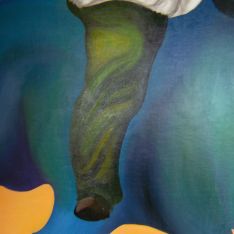
DARFURNICA DAY 35 - APRIL 2, 2010
On December 7, 2009, my container with medical equipment arrived in Port Sudan and the work to get it through the customs began. I was prepared to face difficulties, but it has proved to be extremely complicated to get anything through. I decided to shut down my Darfurnica blog for a while to make sure that it wouldn't harm the process of getting the container through the needed set of procedures. However, in the past 4 months the status has gone from "to be burned within a week" to "cleared" to the current state of simply waiting. Many wonderful people are doing whatever they can to help me get the equipment into Darfur, but while I wait I will continue my work on Darfurnica.
It has been nice to have a break from the painting to study some more on the history of Sudan as well as spending a lot of time looking at what I have done so far to make sure the composition ends up how I want it. In the book Manufacturing Consent – The Political Economy of the Mass Media by Edward S. Herman and Noam Chomsky I found two paragraphs which clearly describe what I try to point out with Darfurnica:
Although the Internet has been a valuable addition to the communications arsenal of dissidents and protesters, it has limitations as a critical tool. For one thing, those whose information needs are most acute are not well served by the Internet – many lack access, its databases are not designed to meet their needs, and the use of databases (and effective use of the Internet in general) presupposes knowledge and organization. The Internet is not an instrument of mass communication for those lacking brand names, an already existing large audience, and/or large resources. Only sizable commercial organizations have been able to make large numbers aware of the existence of their internet offerings. (...)
In his book, Golden Rule, political scientist Thomas Ferguson argues that where the major investors in political parties and elections agree on an issue, the parties will not compete on that issue, no matter how strongly the public might want an alternative. He contends that for ordinary voters to influence electoral choices they would have to have “strong channels that directly facilitate mass deliberation and expression”. These would include unions and other intermediate organizations that might, through their collective power, cause the interests of ordinary voters to be given greater weight in the political system.
The propaganda model, and the institutional arrangements that it reflects, suggests that the same forces that preclude competition among the parties on issues on which the major investors agree, will also dominate media choices and rule out “mass deliberation and expression” on those issues. For example, polls regularly indicate that, except in periods of war and intense war propaganda, the public wants a smaller defense budget and favors a spending shift from defense to education and other civil functions. But because the major investors agree that a large defense budget is desirable, the two dominant parties compete only on whether the one or the other is stinting on military expenditures, with both promising to enlarge it (as both George W. Bush and Al Gore did in the presidential election campaign of 2000). And the mainstream media do the same, limiting debate to the terms defined by the two parties and excluding deliberation and expression of the position that large cuts are desirable.
I couldn't agree more with the authors and I find it SO important that we consider and debate about our priorities as our choices in the west about who and what to care for has such a profound impact on the lives of many other people, especially in a place like Darfur. Furthermore, the elections are coming up in Sudan and it will be interesting to witness how it will develop.
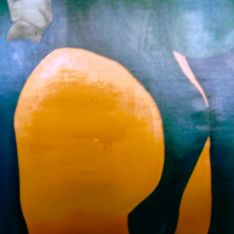
DARFURNICA DAY 34 - NOVEMBER 22, 2009
The former marine captain Brian Steidle shows his experiences in Darfur in the amazing film The Devil Came On Horseback. Anyone who has seen this film will probably agree with me that it is truly schocking how much it takes to get the international community to respond to what is happening in Darfur.
Brian Steidle took a job in Sudan in 2004 to monitor the ceasefire and witnessed the most horrific things. He saw entire villages burned to ashes with the remains of children chained to trees and burned alive. He saw people with their ears cut off and their eyes picked out. While monitoring the alleged ceasefire he witnessed how armed helicopters left Al Fashir in the mornings and returned empty in the evenings.
He was also collecting testimonials from the people in Sudan. Mostly it was difficult because they were afraid of being killed or imprisoned if they spoke up. The people he did talk to confirmed that the people being killed by the Janjaweed are African, not Arab. During the attacks the phone towers would be cut off so no cell phones could be used. The villages would be bombed and then the Janjaweed would ride in right after and kill the survivors of the bombings. The Janjaweed have confirmed that they receive weapons, training and money from the government.
In the film, a Janjaweed defector is interviewed:
Interviewer:
Does the government ask the Janjaweed to attack a specific village?
Janjaweed defector: They give order to attack any village. Every village that gives them trouble, they attack.
Interviewer: Were you told to kill the people in the village?
Janjaweed defector: The order is to go kill. After the plane, we attack.
Interviewer: So the leaders tell you to attack?
Janjaweed defector: Yes. He blows a whistle. When they are going to attack a village they spread around, they start repeating their specific slogans. Then they all attack directly and quickly. Some will die, some will survive.
Interviewer: What are the slogans?
Janjaweed defector: Kill the slaves, kill the slaves.
Brian Steidle was a part of a monitoring team that handed in more than 80 reports about the situation in Darfur to the head quarters in Al Fashir, but strangely only 4 of them made it to the American Embassy in Darfur.
In mid 2004 Colin Powell declared that genocide has been committed in Darfur and that the government in Sudan and the Janjaweed bare responsibility. But instead of going in, the US government just called out to the UN to initiate a full investigation.
Meanwhile, Steidle witnessed continuing attacks, which could easily be predicted. “Even when we can predict what's going to be attacked, the African Union isn't doing anything about it”, he says in the film.
Frustrated with not being able to protect the people, he chose to leave the mission. Back in the US he realized that none of his colleagues had been talking about what was happening in Darfur.
Through Brian's sister Gretchen, The New York Times heard about his photos and experiences. They wanted to share the information to bring attention to Darfur. On the same day as the article came out, he received calls from the State Department asking him not to show the photos. But, eager to get the information out to the public, he continued giving numerous interviews and speeches about his experiences in Sudan.
Later he got a chance to present his photos to Condoleeza Rice, but felt that he got a completely political answer: “Thank you for what you are doing, it must have been hard, here are your photos back. We are doing whatever we can do”. And even though Brian's story and photos got a lot of media attention, the story died out with no results for the people in Darfur.
Eventually Steidle helped the ICC to press charges against Sudan's president Al Bashir by sharing his experiences, reports and photos.
In the end of the film Brian says: “I am just a guy who tried to wake up the consciousness of a bunch of people. That's all.” I think he did an amazing job with this film and I regret that his efforts didn't pay off immediately the way they should. Nevertheless the film tells an important part of history and inspires people like myself to continue to talk and act on behalf of Darfur until they receive the help they need.
THIS IS A GENERAL HUMANITARIAN CRISIS THAT IS NOT BEING ADDRESSED!
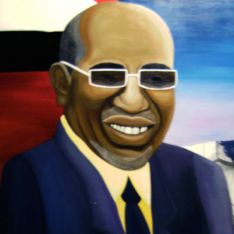
DARFURNICA DAY 33 - NOVEMBER 19, 2009
I have received emails and comments from people asking about the background for the situation in Darfur and I will try to map it out in the coming posts. In 2004, a ceasefire ended a 20-year civil war in Sudan. In less than six months a conflict emerged in Darfur that threatened to ignite the entire region. The Sudanese government and rebel groups were in the final negotiations of a peace agreement that would end the two decade long civil war between the predominantly Muslim north and the Christian south. Meanwhile, a separate conflict in the Darfur region in western Sudan emerged.
The ceasefire negotiations between the north and south didn't include Darfur and Darfur wanted something of what the south had been promised. Like a share of Khartoum's wealth and resources.
The north of Sudan is mainly Arab and the government in Sudan is controlled by the leaders of these Arab tribes. The people of Darfur want a role in this government. They want to be able to have economic development on their land. And Khartoum doesn't want them to have this. The conflict started with two main rebel groups: The SLA (Sudanese Liberation Army) and the JEM (Justice and Equality Movement). Overall these rebel groups are fighting for Darfur. They want equal rights and choices on property. They want education for their kids.
On April 24 in 2003, rebel groups attacked an airport in Al Fashir. They went into the airport and destroyed a number of air crafts and killed close to 75 people. This was one of the largest actions ever against the Sudanese government. The government decided to fight back against these Africans who competed for land and resources. They closed off Darfur, kicked our all the foreigners and went on a killing spree. They even cut off the phone lines so the people in Darfur didn't have any chance of contacting the outside world and ask for help. The numbers of victims were horrendous, for example an entire village with 30.000 people was executed in three days.
The government trained Arab militias called the Janjaweed to attack and burn down the villages. The Khartoum government still denies helping these militiamen but officials say that the Janjaweed are armed by the central authorities.
In the past 6 years the genocide has claimed many lives and displaced as many as 3 million people. Numerous villages has been burned to the ground, women have been raped and children have been stolen and trained as child soldiers. The politicians agree that it IS genocide but nothing happens to stop it. Then the ICC put out an arrest warrant for President Al-Bashir in spring this year but again - nothing happens. So far he has traveled a lot within the African Union who declines to back up the arrest warrant.
And now he has even been invited to the Climate Conference in Copenhagen this winter. The Danish Prime Minister, Lars Løkke Rasmussen, added that President Bashir would be arrested if he shows up, but to me the invitation itself is ridiculous. This man is responsible for the killings of up to 400.000 people and other atrocities. Why give him an invitation as all other world leaders? Why not go in and get him? Why not send a signal to him, stating that his actions are being condemned by the international society and that the arrest warrant is a serious attempt to stop him? It seems self-contradictory by the United Nations to name the Darfur conflict GENOCIDE and still insist that every world leader – also Bashir - is invited to the conference.
Just a week ago he visited Turkey. Turkey's president, Recep Tayyip Erdogan, welcomed Bashir and didn't see the problem since “Muslims don't commit war crimes”. Hm.... Was there EVER a religion which didn't commit war crimes?
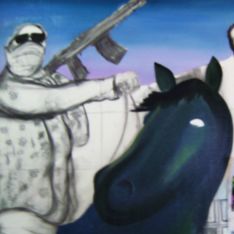
DARFURNICA DAY 32 - NOVEMBER 17, 2009
November 9 was an amazing day! I was finally able to pack a 40' container with the hospital equipment I have been collecting for Darfur for one and a half year! I was lucky to get help from friends and together we managed to fit in 38 hospital beds complete with mattresses, covers and sheets, 21 wheelchairs, 5 baby beds, 15 walkers and much more. When the container arrived I thought it was huge and I was surprised to see how fast we filled it up. We couldn't fit in all the donated equipment so it will be put in the next container.
I am already receiving many donations from different Danish hospitals so I hope that all the equipment will make it there safe and make a difference for the patients.
I would like to share this great article I read in The Huffington Post today:
It is written by Jerry Fowler, the president of the Save Darfur Coalition.
China: Obama's Test
As President Obama travels to China this week, he unquestionably has a full plate of priorities to discuss with the Chinese government. The economy, trade wars, nuclear proliferation, and security cooperation will all receive significant amounts of attention, as well they should. Some commentators are describing the President’s trip to China as a test of his foreign policy prowess; it will also serve as a test of his dedication to resolving one of the thorniest problems currently plaguing the international community: Sudan. On October 19th, Secretary of State Hillary Clinton, UN Ambassador Susan Rice and Special Envoy for Sudan Scott Gration unveiled the administration’s long-awaited Sudan policy review. In it, the administration asserted that “sustained political will to address Sudan’s tough challenges in the international community is sometimes lacking. American leadership is essential to a more effective multilateral approach.”
President Obama can make good on that promise of American leadership in Beijing. China has a key role to play in bringing peace to Darfur and full implementation of the North-South Comprehensive Peace Agreement (CPA). No nation holds more leverage over Sudan than does China. Sudan exports 70 percent of its oil (its main source of hard currency) to China, has an extensive military relationship with the Chinese government, and counts on China to veto tough multilateral sanctions at the United Nations on Sudan’s behalf. Yet China has mostly played the role of Khartoum’s “heat shield,” protecting it from international pressures.
If President Obama is serious about his administration’s dedication to building a multilateral coalition to address the crises in Darfur, he could do no better than by starting in Beijing and convincing his hosts that they need to play a more constructive role in building a stable, peaceful Sudan, instead of continuing to blindly stand by a regime headed by an indicted war criminal. But why should China listen? It has always craved greater international respect and an enhanced role for its leadership. Sudan provides an opportunity for China to act as a responsible world power.
But President Obama has a strong argument to make to President Hu Jintao that even China’s narrower self-interests should motivate it to work in concert with the U.S. in Sudan. The reason is clear: China has come to count on access to Sudan’s oil, much of which is in South Sudan, and has invested billions. If the North-South conflict is reignited, as is all too plausible, China could lose access to those oil fields. Even if conflict does not reignite between the North and South, the South will hold a referendum on its independence in January 2011, at which point the world may be dealing with the new republic of South Sudan. It behooves China to have a seat at the table during the run-up to this process so that its oil concessions can be adequately protected during any process of state separation. In short, President Obama has set viable terms for engaging the Khartoum regime, and he should encourage his Chinese counterpart, President Hu Jintao, to join the effort.
When the Chinese recognize that peace in Sudan serves their interests, there are ways in which China can begin to demonstrate to the Sudanese and the world that it is serious. For example, the president should encourage China to condition any debt write-off owed to it by the Government of Sudan or its proxies on concrete and lasting progress on the ground in Darfur and throughout Sudan. The Government of Sudan has accrued $36 billion in debt, owed mostly to multilateral, Western, Chinese, and Arab creditors. Securing debt-relief has become a major priority for the Sudanese government. Darfur activists inside and outside Sudan support debt cancellation as a long-term incentive for Khartoum’s implementation of the CPA, respect for democracy and human rights, and an end to violence in Darfur. But to cancel this odious debt pre-emptively, before the regime has changed its behavior, would not only relinquish an important source of leverage over Khartoum, it would throw good money after bad. China should also refrain from granting any new loans to the Government of Sudan until it meets such conditions as fully cooperating with the peacekeeping force in Darfur (UNAMID), faithfully implementing the CPA, and cooperating with the International Criminal Court.
There is no substitute for President Obama’s leadership if the situation in Sudan is to be successfully resolved. But, as the president’s own policy outlines, it will take an international coalition to prod the Government of Sudan into taking the steps toward peace that the international community has called for, time and time again. If President Obama is serious about creating that coalition, he must start in Beijing, and he must start now. China’s economic leverage in Sudan, used in the right way, is a necessary ingredient to creating a safe and secure Sudan. The afflicted people of Darfur and other disaffected Sudanese will be watching closely to see if President Obama backs his policy pronouncement with action and passes his test in Beijing.
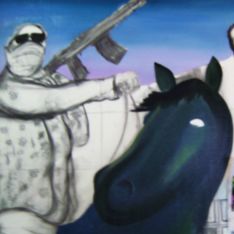
DARFURNICA DAY 31 - OCTOBER 19, 2009
The last month I have visited numerous exhibitions in Holland, Germany and Denmark, getting inspiration for Darfurnica. Not surprisingly I didn't see a single art work about the situation in Darfur although it is one of the most horrific current situations. But since Darfur isn't covered a lot in the media, I guess the artists aren't realizing the urgency to speak up.
In the same period I have been working hard on my goal to ship a container with hospital equipment to the Elfasher Teaching Hospital and the Elfasher Maternity Hospital in Darfur. If everything goes according to plan, the container will leave Denmark on November 5. I am going to need help with the packing so I will announce all the details soon in case you would like to come and help. The big day is coming up after 15 months of hard work!
I would also like to share this newsletter from the Save Darfur Coalition, sent on October 15:
Did you hear who is trying to get a license to lobby Congress and President Obama?
It's none other than the government of Sudan, led by indicted war criminal Omar al-Bashir.
First, a former national security advisor accepted a $1.3 million contract to lobby for Sudan.(1) Now it's surfaced that a prominent law firm requested permission to lobby for Sudan's genocidal government.(2)
At this moment, the Treasury Department could still grant a waiver to lobbyists for Sudan.
Bashir doesn't need high-priced lobbyists to bring peace to Sudan. His government can make concrete and lasting progress towards peace in Darfur, agree to full implementation of the Comprehensive Peace Agreement, and make significant structural, political and judicial reforms that fundamentally change the repressive systems in Sudan without spending millions of dollars to hire lobbyists.
But Omar al-Bashir doesn't want to do what's right. Instead, he wants to use expensive lobbyists to polish his regime's image.
We don't yet know the full extent of the Sudanese government's efforts to use slick PR firms to advance its agenda, but news this week confirms that it is up to no good.
The Washington Post recently revealed(1) that the Government of Sudan paid disgraced former national security advisor Robert "Bud" McFarlane $1.3 million - using the government of Qatar as a flimsy intermediary - to lobby the U.S. government on behalf of Sudan.
And just days ago, a follow-up investigation outlined the efforts of Robert B. Crowe, a prominent lobbyist with Nelson Mullins Riley & Scarborough, to gain approval to lobby on behalf of Sudan.(2) Their scheme included efforts to get members of Congress to support a waiver of the economic sanctions that prevent U.S. firms from doing business with Sudan.
If we act now, we can stop these lobbyists in their tracks. The Treasury Department's Office of Foreign Assets Control can grant waivers that would allow Crowe or other lobbyists to represent the government of Sudan. Send a letter directly to the Treasury Department today saying NO to lobbyists for Sudan.

DARFURNICA DAY 30 - SEPTEMBER 1, 2009
As Europe marks the outbreak of World War II, world leaders have spoken about the events of the past and issues faced in the future. But while remembering all the people who died tragically in the second world war, it would be accurate to mention those who are still suffering today, as in Darfur.
Almost three million people are said to have been displaced by the fighting and they need help now! This week I am going to Denmark to pick up the next donation of hospital equipment from Gentofte Hospital in Copenhagen. Then I think we finally have enough to fill up the first 40' container and will be able to ship it soon.
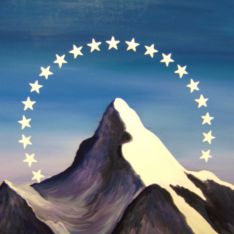
DARFURNICA DAY 29 - AUGUST 28, 2009
Today it is exactly 46 years ago that Martin Luther King Jr. delivered his I Have A Dream speech before the Lincoln Memorial as the keynote address of the March on Washington, D.C., for Civil Rights. Television cameras allowed the entire nation to hear and see him plead for justice and freedom. Listen to this:
I am happy to join with you today in what will go down in history as the greatest demonstration for freedom in the history of our nation.
Five score years ago, a great American, in whose symbolic shadow we stand today, signed the Emancipation Proclamation. This momentous decree came as a great beacon light of hope to millions of Negro slaves who had been seared in the flames of withering injustice. It came as a joyous daybreak to end the long night of their captivity.
But one hundred years later, the Negro still is not free. One hundred years later, the life of the Negro is still sadly crippled by the manacles of segregation and the chains of discrimination. One hundred years later, the Negro lives on a lonely island of poverty in the midst of a vast ocean of material prosperity. One hundred years later, the Negro is still languished in the corners of American society and finds himself an exile in his own land. And so we've come here today to dramatize a shameful condition.
In a sense we've come to our nation's capital to cash a check. When the architects of our republic wrote the magnificent words of the Constitution and the Declaration of Independence, they were signing a promissory note to which every American was to fall heir. This note was a promise that all men, yes, black men as well as white men, would be guaranteed the "unalienable Rights" of "Life, Liberty and the pursuit of Happiness." It is obvious today that America has defaulted on this promissory note, insofar as her citizens of color are concerned. Instead of honoring this sacred obligation, America has given the Negro people a bad check, a check which has come back marked "insufficient funds."
But we refuse to believe that the bank of justice is bankrupt. We refuse to believe that there are insufficient funds in the great vaults of opportunity of this nation. And so, we've come to cash this check, a check that will give us upon demand the riches of freedom and the security of justice.
We have also come to this hallowed spot to remind America of the fierce urgency of Now. This is no time to engage in the luxury of cooling off or to take the tranquilizing drug of gradualism. Now is the time to make real the promises of democracy. Now is the time to rise from the dark and desolate valley of segregation to the sunlit path of racial justice. Now is the time to lift our nation from the quicksands of racial injustice to the solid rock of brotherhood. Now is the time to make justice a reality for all of God's children.
It would be fatal for the nation to overlook the urgency of the moment. This sweltering summer of the Negro's legitimate discontent will not pass until there is an invigorating autumn of freedom and equality. Nineteen sixty-three is not an end, but a beginning. And those who hope that the Negro needed to blow off steam and will now be content will have a rude awakening if the nation returns to business as usual. And there will be neither rest nor tranquility in America until the Negro is granted his citizenship rights. The whirlwinds of revolt will continue to shake the foundations of our nation until the bright day of justice emerges.
But there is something that I must say to my people, who stand on the warm threshold which leads into the palace of justice: In the process of gaining our rightful place, we must not be guilty of wrongful deeds. Let us not seek to satisfy our thirst for freedom by drinking from the cup of bitterness and hatred. We must forever conduct our struggle on the high plane of dignity and discipline. We must not allow our creative protest to degenerate into physical violence. Again and again, we must rise to the majestic heights of meeting physical force with soul force.
The marvelous new militancy which has engulfed the Negro community must not lead us to a distrust of all white people, for many of our white brothers, as evidenced by their presence here today, have come to realize that their destiny is tied up with our destiny. And they have come to realize that their freedom is inextricably bound to our freedom.
We cannot walk alone.
And as we walk, we must make the pledge that we shall always march ahead.
We cannot turn back.
There are those who are asking the devotees of civil rights, "When will you be satisfied?" We can never be satisfied as long as the Negro is the victim of the unspeakable horrors of police brutality. We can never be satisfied as long as our bodies, heavy with the fatigue of travel, cannot gain lodging in the motels of the highways and the hotels of the cities. We cannot be satisfied as long as the negro's basic mobility is from a smaller ghetto to a larger one. We can never be satisfied as long as our children are stripped of their self-hood and robbed of their dignity by signs stating: "For Whites Only." We cannot be satisfied as long as a Negro in Mississippi cannot vote and a Negro in New York believes he has nothing for which to vote. No, no, we are not satisfied, and we will not be satisfied until "justice rolls down like waters, and righteousness like a mighty stream."¹
I am not unmindful that some of you have come here out of great trials and tribulations. Some of you have come fresh from narrow jail cells. And some of you have come from areas where your quest -- quest for freedom left you battered by the storms of persecution and staggered by the winds of police brutality. You have been the veterans of creative suffering. Continue to work with the faith that unearned suffering is redemptive. Go back to Mississippi, go back to Alabama, go back to South Carolina, go back to Georgia, go back to Louisiana, go back to the slums and ghettos of our northern cities, knowing that somehow this situation can and will be changed.
Let us not wallow in the valley of despair, I say to you today, my friends. And so even though we face the difficulties of today and tomorrow, I still have a dream. It is a dream deeply rooted in the American dream. I have a dream that one day this nation will rise up and live out the true meaning of its creed: "We hold these truths to be self-evident, that all men are created equal." I have a dream that one day on the red hills of Georgia, the sons of former slaves and the sons of former slave owners will be able to sit down together at the table of brotherhood. I have a dream that one day even the state of Mississippi, a state sweltering with the heat of injustice, sweltering with the heat of oppression, will be transformed into an oasis of freedom and justice.
I have a dream that my four little children will one day live in a nation where they will not be judged by the color of their skin but by the content of their character. I have a dream today! I have a dream that one day, down in Alabama, with its vicious racists, with its governor having his lips dripping with the words of "interposition" and "nullification" -- one day right there in Alabama little black boys and black girls will be able to join hands with little white boys and white girls as sisters and brothers. I have a dream today! I have a dream that one day every valley shall be exalted, and every hill and mountain shall be made low, the rough places will be made plain, and the crooked places will be made straight; "and the glory of the Lord shall be revealed and all flesh shall see it together."2
This is our hope, and this is the faith that I go back to the South with.
With this faith, we will be able to hew out of the mountain of despair a stone of hope. With this faith, we will be able to transform the jangling discords of our nation into a beautiful symphony of brotherhood. With this faith, we will be able to work together, to pray together, to struggle together, to go to jail together, to stand up for freedom together, knowing that we will be free one day.
And this will be the day -- this will be the day when all of God's children will be able to sing with new meaning:
My country 'tis of thee, sweet land of liberty, of thee I sing. Land where my fathers died, land of the Pilgrim's pride, From every mountainside, let freedom ring! And if America is to be a great nation, this must become true. And so let freedom ring from the prodigious hilltops of New Hampshire. Let freedom ring from the mighty mountains of New York. Let freedom ring from the heightening Alleghenies of Pennsylvania. Let freedom ring from the snow-capped Rockies of Colorado. Let freedom ring from the curvaceous slopes of California. But not only that: Let freedom ring from Stone Mountain of Georgia. Let freedom ring from Lookout Mountain of Tennessee. Let freedom ring from every hill and molehill of Mississippi. From every mountainside, let freedom ring. And when this happens, when we allow freedom ring, when we let it ring from every village and every hamlet, from every state and every city, we will be able to speed up that day when all of God's children, black men and white men, Jews and Gentiles, Protestants and Catholics, will be able to join hands and sing in the words of the old Negro spiritual: Free at last! Free at last! Thank God Almighty, we are free at last!
Amazing words. Amazing man. And his viewpoint is just as important today as it was 46 years ago. We can never be satisfied as long as injustice and atrocities are going on against any human being. No matter our own part in the situation. If you don't speak up, you participate!
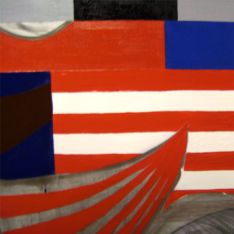
DARFURNICA DAY 28 - AUGUST 24, 2009
This week the Save Darfur Coalition reached one of their fundraising goals and they will now be able to project a huge Darfur/Darfur exhibit in New York City during the U.N. General Assembly in September. That means when world leaders hit NYC, they'll come face to face with reality in a big, powerful way. To impact the key world leaders who are participating in the General Assembly they have created a petition:
Add your voice – don't forget Darfur
In one month, world leaders will come together in New York City to discuss humanity's most pressing issues: but will they make peace in Sudan a priority?
Sign our petition urging President Obama to remember the people of Sudan.
Petition to President Obama:
Subject: Don't forget Darfur,
Your leadership today is critical to resolving the crisis in Darfur and building a better tomorrow for civilians throughout Sudan. Helping to bring peace to Sudan is not something the U.S. can accomplish alone. U.S. leadership must play a central role in galvanizing the peacemakers in Sudan and the international community to finally solve Sudan's recurrent crises.
The upcoming session of the U.N. General Assembly in New York and meeting of the G-20 nations in Pittsburgh offer two ideal opportunities to lend the weight of your personal engagement to your policy plan for Sudan.
During the UN General Assembly, I therefore call on you to:
- Include a section on Darfur and Sudan in your speech to the General Assembly
- Raise Darfur and Sudan during any head of state session of the Security Council
- Bring up Darfur and Sudan in bilateral meetings with key heads of state
During the G-20 meeting, I likewise call on you to:
- Raise Darfur and Sudan in talks with key heads of state
- Condition a debt forgiveness package for Sudan directly on progress in Darfur and full implementation of the Comprehensive Peace Agreement
There are no easy fixes for Sudan, and real progress will likely take time. But the wait for peace will be shorter and the lives lost will be fewer with your robust personal engagement. Thank you for your commitment to bringing peace to Sudan. I look forward to your leadership at this critical time.
More than 15,000 people already signed the petition, asking President Obama to make peace in Sudan a priority at the U.N. General Assembly in September.
I signed the petition today. You can sign it here: www.savedarfur.org
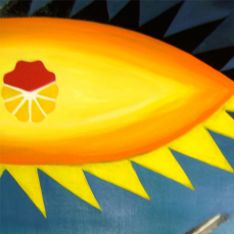
DARFURNICA DAY 27 - AUGUST 23, 2009
Today I finished my lamp with the PetroChina logo. My great grandmother is Chinese and some years ago my grandmother invited the entire family on a trip to China to see where she grew up before the family had to move to Denmark.
To me, traveling through China felt similar to traveling through other Asian countries: It is an overwhelming mixture of mind-blowing nature, friendly people, exotic food, incredible views and adventurous experiences. But at the same time it also displays an extreme difference between rich and poor.
In front of one of the hotels we stayed at, entire families were living in cardboard boxes. Imagine: Entire houses built of cardboard wrappings. They were in a variety of sizes depending on how many people who lived in them. I found it very difficult not to feel like an evil, rich European when I walked into the hotel and passed a 4-year old girl sitting in a box that used to wrap a huge flat screen television. I will never forget that image. It was so vivid that you would have thought it was political art. But she was real. During one of the nights we stayed there there was a big storm, and the next day all the boxes were gone. It looked like an entire street was missing.
On a trip I spoke to a Chinese tour guide and asked her questions about the housing situation for people without a lot of money. She told me that everyone was getting ready for the Olympics and they needed room to house all the foreign guests. She showed us an entire city – brand new – completely empty because it was being saved for the guests to come. I asked her what happened to the people who used to live in the area? And she said: China's economy is exploding and the Olympics is a huge opportunity. So, if some civilians are in the way, the are removed. Where to? No where, she said. They just bring bull dozers and tear down the houses.
I guess the people in Darfur are also “in the way” since China have been so reluctant to reconsider their oil trading with Sudan, even though it is clear what their money are funding.
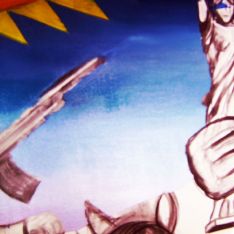
DARFURNICA DAY 26 - AUGUST 22, 2009
I am starting to realize that the making of Darfurnica is like running a marathon. The persistency I need to put in the work can be a bit overwhelming because I am so eager to do it right. In a way my involvement in this art work is also a statement in itself because it tries to deal with the common attitude; to close your eyes to horrific situations. The complete opposite than working with it many hours every day.
In the book Not On Our Watch which inspired me to get engaged in the Darfur situation, John Prendergast explains how he got involved with NGO work:
I loved my work and I loved what I was studying at school on urban policy, but in 1983 a story broke that changed my life forever. The famine in what is now Ethiopia and Eritrea emerged into the public consciousness very slowly, as these kinds of issues do, if they ever do at all. I kept seeing these pictures of mass starvation (mostly on those post-midnight fund-raising paid programs that organizations buy to highlight the horrors they are trying to ameliorate with their food and medicine) and reading into them messages of a world that just didn't care enough to do whatever was necessary to end the suffering of those people. There were images of hundreds of thousands of homeless Ethiopians and Eritreans in makeshift camps – people living and dying in the worst circumstances humanly possible. I was overwhelmed by the pictures; all of my empathic and protective tendencies went into overdrive. I hadn't studied any of these issues, but I knew at the bottom of it all there must lie a massive core of injustice, overlaid by a blanket of apathy.
This is exactly how I felt after I read Not On Our Watch and started researching what was going on in Darfur.
After deciding to get involved and try to do something it has been quite the roller coaster ride in experiences and emotions. First – there is so much to learn. And then I have realized that it is a choice every day to be involved and stay involved. It actually feels like switching your whole way of thinking. Especially with a subject as Darfur that gets so little media attention because it doesn't have any news value anymore, staying focused and working on means everything. Even if it is not reported in the media, the situation stays the same.
This week, after I exited told everyone I know or met that my application was approved so I will be able to ship the 40' container with medical equipment to Darfur, MANY people said to me: “OK, now you did it, that's great, but then it is also time to get back to your normal life”. I am completely puzzled by that. And I feel the opposite way. I feel like, if I can make that happen, the sky is the limit. And from all the things I have done in my entire life, starting a Darfur campaign, shipping a container with medical equipment and starting painting Darfurnica are probably the most positive things by far. But somehow I am moving around outside my “box”, which makes people eager to get me back doing “normal” things.
Let's change the boxes instead!
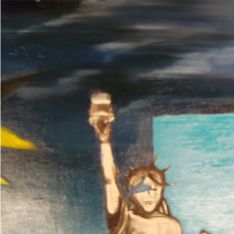
DARFURNICA DAY 25 - AUGUST 21, 2009
This past week I have been working on the background colors over and over. It is finally starting to look like I want it. People from around the area where I work have started to make trips to my studio to see the work in progress and the room is often full of people discussing Darfur. It is wonderful to see that people who are 80 years old show a great interest in the subject as well as teenagers do. They all relate to different elements, but the painting is making a bridge between the different age groups and opens up for many interesting conversations.
A few days ago I received wonderful news: The Danish organization MS Action Aid has approved my application which means they will sponsor the shipment of my container with hospital equipment for Darfur. I have been working on that project for so long now that it feels amazing to get so close to reaching the goal. In two weeks I will go to Copenhagen again to pick up yet another donation from Gentofte Hospital. They have given me so much medical equipment now that the initial 20' container has grown into a 40' container. Absolutely wonderful!
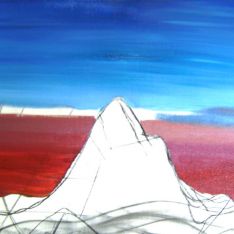
DARFURNICA DAY 24 - AUGUST 13, 2009
Today I continued working on the background. It will take many more layers to get it how I want it, but slowly it is getting there.
I would like to share a Darfur update I received in a newsletter from the Save Darfur Coalition:
Do world leaders think Darfur is saved? President Obama still hasn't released his peace plan. The U.N. Security Council, European Union, Arab League and African Union all keep dragging their feet on getting tough with Bashir. And yet as violence in Darfur has dropped, violence in South Sudan has sky-rocketed. Just last week, new brutal ethnic violence killed at least 185 in the southern Jonglei State. In one month, world leaders will come together in New York City to discuss humanity's most pressing issues: but will they make peace in Sudan a priority? This is a crucial moment in our struggle to bring peace to Sudan. Some experts believe the rise in insecurity in South Sudan could reignite the brutal war that killed over 2 million. Vote now to name our new campaign:
1. Speak up for Sudan
2. Standing for Sudan
3. Don't forget Darfur
4. Darfur: now more than ever
5.IDP - I Demand Peace
By voting your name will be added to our new petition. We're kicking the campaign off with a new petition to President Obama, but our success depends on your taking direct ownership of this campaign.

DARFURNICA DAY 23 - AUGUST 12, 2009
This past week my unwavering faith in my work was taken over by fear. For some reason I couldn't get started and just watched the painting and overanalyzed the whole project. Perhaps it is normal for artist to develop a schizophrenic relationship to the works that are closest to their hearts.
But now I am just going to continue and try painting instead of thinking.
ALL OPINION IS TRANSCIENT. ONLY THE WORK OF ART REMAINS. - Man Ray
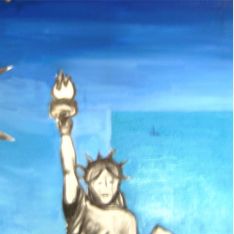
DARFURNICA DAY 22 - AUGUST 6, 2009
Today I continued working on the lightbulb and starting working on the background. It is quite a challenge to work in this size. My landlord built me this really nice scaffold to stand on. It is made out of wood and when I am in it I feel like working from a hut in a tree top. It is amazing how the image develops through the colors. I had everything planned out on my sketch, but as I work on, the painting starts to unfold itself and I see that some things have to be different than I planned. Sometimes I apply a color and then it feels like that color is asking for another color next to it. And not always the one I planned in my head.
I hope that Darfurnica in the end will express the underlying meanings through the colors. The elements I chose to use are very explicit but to me the story of genocide goes way beyond pointing fingers at specific people. It is a story about how human beings act and relate to each other.
And pointing fingers are never going to change anything about the way we act. It is true what Thich Nhat Hanh writes in his beautiful book, Peace Is Every Step:
Blaming Never Helps
When you plant lettuce, if it does not grow well, you don't blame the lettuce. You look into the reasons it is not doing well. It may need fertilizer, or more water, or less sun. You never blame the lettuce. Yet if we have problems with our friends and family, we blame the other person. But if we know how to take care of them, they will grow well, like lettuce. Blaming has no positive effect at all, nor does trying to persuade using reason and arguments. That is my experience. No blame, no reasoning, no argument, just understanding. If you understand, and you show that you understand, you can love, and the situation will change. One day in Paris, I gave a lecture about not blaming the lettuce. After the talk, I was doing walking meditation by myself, and when I turned the corner of a building, I overheard an eight-year-old girl telling her mother, “Mommy, remember to water me. I am your lettuce.” I was so pleased that she had understood my point completely. Then I heard the mother reply, “Yes, my daughter, and I am your lettuce also. So please don't forget to water me too.” Mother and daughter practicing together, it was very beautiful.
So, to avoid genocide from happening again and again in the world, we have to look closer and find the underlying reasons for the lettuce that doesn't grow well. Because we are all in the same garden.
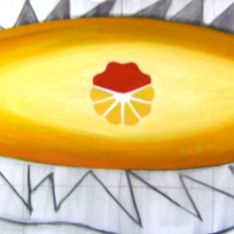
DARFURNICA DAY 21 - AUGUST 4, 2009
Today I started working on the big light bulb in Darfurnica. PetroChina's logo is shining in the center of the genocide. Every suggestion there has been made to solve the situation has clashed with the intensive oil trade that is going on in Sudan. So when people say that the genocide has nothing to do with them, I am thinking that things are closer related than they seem. China needs the oil to feed their exploding industry, and where do all these items go? I don't know any western household which doesn't have a severe number of Made In China items. The industry is growing so fast in the east to keep up with the needs of a relatively small group of people in the west.
Eckhart Tolle describes the need to consume so accurate in his wonderful book, A New Earth:
The people in the advertising industry know very well that in order to sell things that people don't really need, they must convince them that those things will add something to how they see themselves or are seen by others; in other words, add something to their sense of self. They do this, for example, by telling you that you will stand out from the crowd by using this product and so by implication be more fully yourself. Or they may create an association in your mind between the product and a famous person, or a youthful, attractive, or happy-looking person. Even pictures of old or deceased celebrities in their prime work well for that purpose. The unspoken assumption is that by buying this product, through some magical act of appropriation, you become like them, or rather the surface image of them. And so in many cases you are not buying a product but an “identity enhancer”. Designer labels are primarily collective identities that you buy into. They are expensive and therefore “exclusive”. If everybody could buy them, they would lose their psychological value and all you would be left with would be their material value, which likely amounts to a fraction of what you paid.
What kind of things you identify with will vary from person to person according to age, gender, income, social class, fashion, the surrounding culture, and so on. What you identify with is all to do with content; whereas, the unconscious compulsion to identify is structural. It is one of the most basic ways in which the egoic mind operates.
Paradoxically, what keeps the so-called consumer society going is the fact that trying to find yourself through things doesn't work: The ego satisfaction is short-lived and so you keep looking for more, keep buying, keep consuming.
Of course, in this physical dimension that our surface selves inhabit, things are a necessary and inescapable part of our lives. We need housing, clothes, furniture, tools, transportation. There may also be things in our lives that we value because of their beauty or inherent quality. We need to honor the world of things, not despise it. Each thing has Beingness, is a temporary form that has its origin within the formless one Life, the source of all things, all bodies, all forms. In most ancient cultures, people believed that everything, even so-called inanimate objects, had an indwelling spirit, and in this respect they were closer to the truth than we are today. When you live in a world deadened by mental abstraction, you don't sense the aliveness of the universe anymore. Most people don't inhabit a living reality, but a conceptualized one.
But we cannot really honor things if we use them as a means to self-enhancement, that is to say, if we try to find ourselves through them. This is exactly what the ego does. Ego-identification with things creates attachment to things, obsession with things, which in turn creates our consumer society and economic structures where the only measure of progress is always more.

DARFURNICA DAY 20 - AUGUST 2, 2009
My container project is moving forward. Maersk Line has offered to ship the equipment for cost price only which means I have to fundraise a much smaller amount to reach my goal. Gentofte Hospital in Copenhagen are giving me everything I had on my "wish list" for the hospitals and Carlsberg is sponsoring a storage room for all the hospital equipment until the shipping of the container. So at the moment I am trying to raise funds for traveling costs when I go back and forth to pick up more equipment, moving trucks for moving it, and money to pay the faxes and fees when the container arrives in Port Sudan. Can you help? Do you work for a company who can help? Then please contact me: info@nadiaplesnerfoundation.org.
I have also learned more about the two hospitals who will receive the equipment I am collecting.
The ElFasher teaching hospital was established in 1916 and expanded in 1985-1987, it’s the only hospital in the state which provides medical service to the whole areas on North Darfur in addition to this it is the referral point from health center and rural clinics. Since the outbreak of conflict in Darfur the hospital found itself catering for the medical needs of IDPs totaling 180,000 approximately.The hospital provides health support now for approximately 900,000 individuals!
The Elfasher Maternity Hospital was donated by the Saudi government and it provides services for women related diseases and deliveries. The hospital has a special wing for Fistula where a specialist from outside the country visits on regular basis to perform operations on fistula patients. It is the only fistula treatment center in the whole of greater Darfur. The hospital also provides psychosocial support to fistula patients. The organization I am working with has recently rehabilitated the hospital wards, the waste disposal system and connected it to the town waterline. Some of the costs particularly for poor patients\IDPs (food and medicine from commercial pharmacies) are paid by local charity groups.
When my container will be shipped it will bring hospital beds, children's hospital beds, incubators, wheel chairs, crutches, drip handles and much more. The sooner it can leave Denmark the better, so please help me if you can.
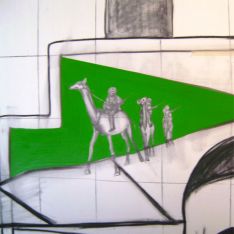
DARFURNICA DAY 19 - JULY 28, 2009
As I begin to add colors to Darfurnica, it is my intention to create a visual experience similar to zapping through television channels, flipping through the paper or clicking through the internet. The way we receive information today – all mixed together despite the nature of each subject and “pimped” to catch and hold our interest within a split second. There is something odd about working with a subject as extreme as genocide and yet knowing that I have to present the story in a specific way to catch people's eyes. I can tell the facts as I know them, but without some sort of entertaining quality to the work, all interest is lost.
I have also found that using my art to raise awareness about Darfur doesn't feel like doing enough. The knowledge, the research and the thorough work with the subject feels too shallow in a way, if I am not doing something specific at the same time. That is why I am also working on shipping hospital equipment to Darfur.
It is a known dilemma: Does it help to depict a horrific situation for the sole sake of sharing it with others? Or are you then equally involved in the ongoing atrocities because you stand by and let it happen without interfering directly?
The South African photojournalist, Kevin Carter, faced the same challenge. He won the Pulitzer Price for a haunting photo of a vulture waiting to eat a small girl.
Kevin Carter made a trip to Sudan in 1993. He saw a small Sudanese girl who had stopped to rest while struggling to a feeding center, whereupon a vulture had landed nearby. He said that he waited about 20 minutes, hoping that the vulture would spread its wings. It didn't. Carter snapped the haunting photograph and chased the vulture away. However, he also came under heavy criticism for just photographing — and not helping — the little girl.
Afterwards, The New York Times bought the photograph and it appeared in the paper for the first time on March 26, 1993. Practically overnight hundreds of people contacted the newspaper to ask whether the child had survived, leading the newspaper to run a special editor's note saying the girl had enough strength to walk away from the vulture, but that her ultimate fate was unknown.
Yesterday, it was exactly 15 years ago that Kevin Carter killed himself. He drove to an area where he used to play as a child, and took his own life by taping one end of a hose to his pickup truck’s exhaust pipe and running the other end to the passenger-side window. He died of carbon monoxide poisoning. He was 33.
Portions of Carter's suicide note read:
"I am depressed ... without phone ... money for rent ... money for child support ... money for debts ... money!!! ... I am haunted by the vivid memories of killings and corpses and anger and pain ... of starving or wounded children, of trigger-happy madmen, often police, of killer executioners...I have gone to join Ken if I am that lucky."
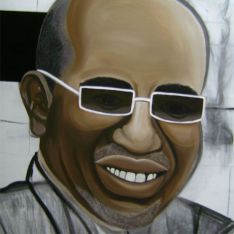
DARFURNICA DAY 18 - JULY 27, 2009
Today I continued to paint the face of Sudan's President al-Bashir. It has almost been 5 months since the International Criminal Court issued his arrest warrant, yet nothing has happened. He and his government can continue their horrific actions. The ICC has already issued two arrest warrants in 2007 for Sudanese Humanitarian (!) Affairs Minister Ahmed Haroun and the Janjaweed militia leader Ali Abdul Rahman. Sudan has refused to hand them over.
Unfortunately, the African Union has decided not to honour the arrest warrant. Since March, President al-Bashir has managed to visit several African countries. On July 4, 2009, at the African Union summit in Sirte, the continent's leaders voted not to back the indictment of Sudan's President over war crimes and crimes against humanity in Darfur. They stated categorically that they will not cooperate with the ICC.
After Picasso's Guernica initially was exhibited in July 1937 at the Spanish Pavilion at the Paris International Exposition, the painting went on tour in Europe.
It then returned briefly to France; after the victory of Francisco Franco in Spain the painting was sent to the United States to raise funds and support for Spanish refugees. At Picasso's request the safekeeping of the piece was entrusted to the Museum of Modern Art (MOMA) in New York City.
A tapestry copy of Guernica is displayed on the wall of the United Nations building in NY, at the entrance to the Security Council room. It was placed there as a reminder of the horrors of war.
On February 5, 2003, in an official act of vandalism, a large blue curtain was placed to cover the work, so that it would not be visible in the background when Colin Powell and John Negroponte gave press conferences at the United Nations. On the following day, it was claimed that the curtain was placed there at the request of television news crews, who had complained that the wild lines and screaming figures made for a bad backdrop, and that a horse's hindquarters appeared just above the faces of any speakers.
Diplomats, however, told journalists that the Bush Administration pressured UN officials to cover the tapestry, rather than have it in the background while Powell or other U.S. diplomats argued for war on Iraq. (Source:www.guernica.eu)
It is amazing that an art work can be considered so powerful, that it has to be covered up while governments present their plans. It only proves that artists around the world must continue to work with the harsh issues to influence the people with power and to start important debates.
When Guernica was hidden behind the blue curtain, it was the same year as when the genocide started in Darfur. Politicians come up with new ways to try to hide from us that things stay the same. New genocides and new wars start over and over. So it is up to us to come up with new ways to show THEM: Enough is enough. There are other ways for humans to communicate than with weapons. We should all start by reading every single book by Eckhart Tolle!
When I was in the middle of my legal battle with Louis Vuitton about my Simple Living campaign, I received a supportive email from UN in New York. And I realized: Art can change things. It can affect people, it can inspire people. It can move people. And while the UN were working on a peace agreement for Darfur, they were happy that I was trying to get people involved. Because the more people who stand up against this genocide, the more pressure is on the governments to help Darfur.
I hope that Darfurnica will appear in the UN one day. And that it won't be covered up with blue curtains.
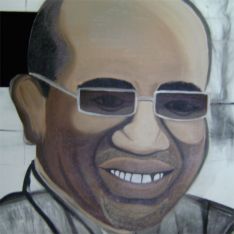
DARFURNICA DAY 17 - JULY 26, 2009
The past two weeks I haven't been able to work on Darfurnica because I have been busy with all kinds of practical issues regarding the hospital equipment I want to ship to Darfur.
There are so many things that has to come together to make it happen, and since I never shipped a container before in my life, there is so much I need to learn. But - I just take it step by step and I am getting closer to my goal every day.
I have also taken the first steps to create a database of hospital equipment from Danish hospitals to avoid that usable things get thrown out. There are so many places it could do so much good, so I am trying to come up with a strong recycle system. And if it works really well, it is my dream that it can be implemented in other rich countries as well. I find it hard to imagine that Denmark is the only country that throws out medical equipment.
Today I started with the oil paint on Darfurnica. There are still many elements I want to implement to tell my story, but I want to see how dominant the existing parts will be in full colour before I add more elements.
It felt equally exciting and nerve wrecking to start with the colours and it is going to take time and many layers of paint to reach my goal. As far as I know, Darfurnica is the first historical painting ever to be painted while the portrayed historical event still was happening. It adds some pressure to get the story right since we don't know the ending yet. I am hoping for a happy as can be - ending with someone coming to the rescue for Darfur. For now, all I can do is pay the people of Darfur my respect by painting the horrors they have to live through, and do my very best at it.

DARFURNICA DAY 16 - JULY 9, 2009
The pictorial maxim the three wise monkeys embody the principle to ”see no evil, hear no evil, speak no evil”. The three monkeys are Mizaru, covering his eyes, who sees no evil; Kikazaru, covering his ears, who hears no evil; and Iwazaru, covering his mouth, who speaks no evil.
Just as there is disagreement about the origin of the phrase, there are differing explanations of the meaning of it. But some believe the message is that a person who is not exposed to evil (through sight or sound) will not reflect that evil in their own speech and actions.
Today "See no evil, hear no evil, speak no evil" is commonly used to describe someone who doesn't want to be involved in a situation, or someone willfully turning a blind eye to the immorality of an act in which they are involved.
Today I added my own version of ”see no evil, hear no evil, speak no evil” in Darfurnica, portraying Chinese President Hu Jintao, Russian President Dmitry Medvedev and former American President George Bush.
Perhaps it is easier to turn the blind eye to the horrific situation in Darfur when you are not in the middle of it. Or perhaps the people in Darfur have no value in the political agenda in today's world since many world leaders choose to let the genocide go on.
In September 2006, The Washington Post posted the following article: Responsible China?
LAST WEEK Wang Guangya, China's ambassador to the United Nations, made a formal statement on Darfur that calls into question China's claim to be treated as a responsible international player. Mr. Wang began by saying that China wants U.N. peacekeepers to be deployed in Darfur, calling this a "good idea and realistic option," one that should be done "as soon as feasible." But then he went on to explain that China was refusing to support the U.N. resolution calling for such a deployment. Unless China changes its position, the result may well be tens of thousands of civilian deaths. Mr. Wang argued that China could not support the resolution because Sudan's government was not yet ready to accept U.N. peacekeepers on its soil. But the reason that Sudan is refusing to allow in peacekeepers is that it has faced little international pressure to do so. The United States and its European partners have called upon Sudan to let the U.N. force in. But China, which has enormous leverage over Sudan because of its investment in Sudanese oil fields, has failed to push the Sudanese into accepting the "realistic option" of a U.N. deployment. Indeed, China lobbied hard and successfully to prevent Russia from supporting the peacekeeping resolution, further undermining pressure on Sudan's government to allow in peacekeepers. Mr. Wang also asserted that, although China supported the peacekeeping resolution in principle, Beijing deemed it "unnecessary for the Security Council to put the draft to the vote in a hurry." How that squares with the call for a deployment "as soon as feasible" is a mystery. Moreover, reports from Darfur suggest that, contrary to the position of the Chinese government, there's every reason to hurry. Sudan's government has declared its intention to launch a new offensive against rebels in northern Darfur, which promises an upsurge of violence in an area that is home to about 250,000 people. The violence is making it impossible for aid workers to help hundreds of thousands of displaced people. Meanwhile the existing African Union peacekeeping force has run out of credibility and money. The stage is set for the worst bout of killing since 2004. At the end of last week's statement, Mr. Wang lamented that the United States and Britain, the two sponsors of the peacekeeping resolution, "have failed to earnestly heed China's sincere efforts." What efforts, precisely? If China really is sincere about its desire to see peacekeepers in Darfur, it should tell its allies in Sudan's government to call off their military offensive and accept U.N. peacekeepers immediately.
Today, almost 3 years later, the situation has only become worse. China and Russia have denied claims by Amnesty International that they are supplying arms to Sudan for use in Darfur, in breach of a UN arms embargo. However, the Amnesty report provided photographs of a Russian Mi-24 attack helicopter at Nyala in Darfur and Chinese Fanfan fighters at Nyala. It also pictured an all-white, Russian-built Antonov 26 military plane, with the registration code ST-ZZZ.
Reportedly, as former American President George Bush read a report on the Clinton administration’s inaction during the genocide in Rwanda, he jotted in the margin, “Not on my watch!”. Strong words encouraging action, but unfortunately he didn't live up to his words.
Now it is up to Barack Obama and other world leaders to agree: Not on our watch – and stop the genocide in Darfur.
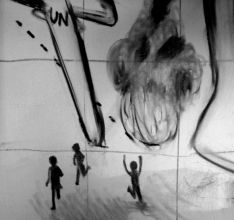
DARFURNICA DAY 15 - JULY 1, 2009
I returned to the Netherlands after a successful trip to Denmark. Together with some wonderful friends and volunteers from the organization Wheels of Action, I went to Gentofte Hospital in Copenhagen and picked up 30 hospital beds and 20 wheel chairs which will all be sent to Darfur as soon as the first container is full. The man in charge of the items also told me that they can provide every single item I had on my “wish list” for the hospitals in Darfur. It is absolutely amazing.
The crazy part is that all these items would have been thrown away if we didn't pick them up. As we were waiting outside for a truck to pick up the items, many people working in the hospital came up to me and asked me where I was taking the things. “I am sending them to Darfur”, I replied, and I can't describe how happy everybody seemed to be when they heard this. They continued to tell me about how they have been watching so much medical equipment in perfectly good state being tossed away and they all thought it should be given to people in need. Yet no one had initiated this.
We had a long talk about how important it is to set up a system to avoid that wealthy countries are in a position where they throw away medical equipment while other countries are in so much need.
Today I added containers to Darfurnica as well as one more bomber and the beginning of Darfur villages, or, what is left of them.
In the amazing documentary film Home, by Yann Arthus – Bertrand, I learned that EVERY year more than 500 million containers travel the world. Most consumer goods travel thousands of kilometers from the country of production to the country of consumption. Since 1950 the volume of international trade has increased 20 times.
When I hear people in my part of the world ask: “What does Darfur have to do with us”?, I don't understand how they can't see how connected we all are. While the rich west consumes and consumes and consumes faster than ever and fool themselves that happiness lies in these changing objects, so many others struggle to cover their basic needs. The battle for water, land and crops has been the starting point of numerous man made conflicts in the world as well as in Darfur. While some people get richer and richer, many people get more and more poor and it leads to desperation.
So in my opinion, to avoid the reoccurrence of genocide and war we need to cover the basic needs of every single person on this planet. Safety, water, food and shelter. But health care, education and democratic political influence is the right of each human being as well. And if you are fortunate enough to be born in a place where all this is your natural right, isn't that single fact enough reason to HAVE TO help others get to the same place? In the strong documentary film, Darfur Now, one of the female members of a rebel group fighting against the Janjaweed says: Fighting alone will not solve the problem in Darfur. Those people who go to school and get an education are the ones who will solve the problem. But fighting with guns, that will not solve it. Even in a hundred years”.
While brave aid workers struggle to get food and supplies in to Darfur to the millions of refugees, the rest of the world fail to back both them and the people in Darfur up with long term solutions.
The condition of life in Darfur imposed by the crimes is unacceptable. The Fur, Zaghawa and Masalit people are not having any of their basic needs met at all. They have lost their land, their cattle and their crops. They have been murdered, wounded, raped and tortured. They have lost all personal belongings as well as many family members and friends. What gives the west the right to stand by and watch silently? We must act now. And I am sure: If the bombers were attacking a European city right this moment, help would already be on the way.
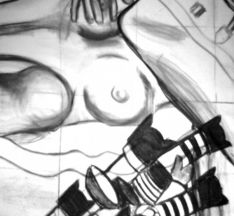
DARFURNICA DAY 14 - JUNE 23, 2009
Today I only had little time and I added some paparazzi cameras. There will be many more later. But for now and the next few days I won't be able to work on Darfurnica. I am on my way to Denmark to pick up a large donation of medical equipment which will be shipped to Darfur shortly. The generous donator is Gentofte Hospital in Copenhagen and I thank them with all my heart for this wonderful gift!
I have received a list from two hospitals in North Darfur State of the equipment they need the most and with this list I have been contacting hospitals. Gentofte Hospital has been very postive from the first time I called them and they are doing their best to complete the list. GREAT!!!
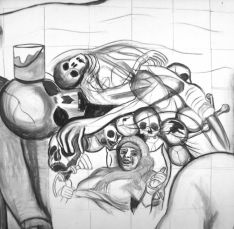
DARFURNICA DAY 13 - JUNE 22, 2009
Deep in the Darfur desert countless bodies are lined up in ditches and exposed when the wind removes the sand. The 400,000 people who have been slaughtered are not the last victims if we don't put an end to the genocide.
Today I added a mass grave to the desert scenery in Darfurnica as well as more Janjaweed militias, this time on camels.
While working, I came to think of this part of “Not On Our Watch”, by Don Cheadle and John Prendergast:
As we stood together in Darfur's golden sand, the stark reality hit us squarely over the head: the Sahara is rolling slowly southward. The desert is advancing, rendering access to basic resources such as land and water a matter of life and death. If you have access to those resources or the support of those in political power, you survive. When there is no democracy, no peaceful way of accessing power, then in Sudan, as in so many other places around the world, people pick up guns to win back their rights. In Darfur, the government of Sudan armed that country's far deadlier version of the Ku Klux Klan, the Janjaweed, a mixed bag of bandits and racist ideologues whose ethnic cleansing of all non-Arab people is mostly motivated by the desire to take over land and steal livestock. John has talked with young Janjaweed recruits. They felt they had no economic alternative. These were the same feelings of the young members of the militias that commited the genocide in Rwanda. Cynical leaders can exploit economic destitution and desperation, and like macabre, racist pied pipers lead people right over the moral cliff.
But the killings are not the only threat to the people in Darfur.
Today I read the following in a newsletter from the Save Darfur Group:
“The rainy season is on its way - and with it greater risk for 2.7 million Darfuris. Help us urge world leaders to move quickly to protect them now - and finally end the suffering. Roads will be washed away in minutes, cutting the flow of aid to 2.7 million Darfuris who depend on it. Displacement camps will be deluged with standing water, leaving millions vulnerable to disease.
Khartoum's expulsion of 13 organizations caused a 40% drop in humanitarian aid capacity. The heroic efforts of the remaining aid groups have succeeded in stockpiling as much food as possible before the rains hit. But medical supplies and sanitation services are largely lacking and, with the heightened risk of disease, there could be tragic consequences.
This is the Sudanese government's design - to keep the world focused on managing the crisis instead of ending it.
We won't let it happen. Together, our movement is demanding progress for long-term peace. We're enlisting congressional allies to pressure the administration and world leaders. We're meeting with administration officials to push for action. And most importantly, we're bringing grassroots pressure to bear on our leaders and giving voice to the constituency of conscience.
But, if there's one thing we've learned, it's that the Bashir regime will not relent on its own. Putting an end to the suffering will take an even greater commitment on our part”.
Like Samantha Power documented in her book on genocide, “A Problem From Hell: America and the Age of Genocide”, “this is the usual response to horrific crimes against humanity: disbelief in the totality of the horror and a genuine hope that the problem will go away. The “problem” won't go away by itself, so let's stand up and help the people in Darfur NOW!
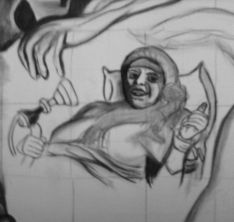
DARFURNICA DAY 12 - JUNE 21, 2009
One of the more bizarre stories this year – which got extreme media coverage – was the death of an English reality show star, Jade Goody. She appeared in the television program Big Brother in 2002 and became a target for the British tabloid press. She was ridiculed for “displaying a severe lack of general knowledge for a British native” and was trashed in many medias. When she appeared on Celebrity Big Brother in 2007, the bad press got worse after Goody made racist comments to an Indian housemate. She made many public apologies and in the summer of 2008, Goody appeared in the Indian version of Big Brother, Big Boss. Two days into the show, Goody was told she had cervical cancer and she subsequently withdrew and went back to England.
Then things changed, and from being targeted by the media she was now treated like a star. The world's first Big Brother Cancer Star! I couldn't believe how Goody's disease became breaking news. The assumed death of ONE person made all the head lines.
The amount of innocent people dying in Darfur and many other places in the world is continuously dismissed by the West, but a reality show star with CANCER – that's a good story.
It is one of the most vulgar events I have ever seen in my life. The sensational head lines, the numerous photo shoots and the silent anticipation for this young woman to die – to complete the story. OK Magazine made the following head lines:
“I KNOW I WILL FALL ASLEEP AND NOT WAKE UP AGAIN” WORLD EXCLUSIVE. “THE CHRISTENING OF JADE AND HER BOYS: MY LAST EVER INTERVIEW AND FINAL PICTURES”. And it went on and on until she died on March 22, 2009.
Several celebrities all over the world mourned her death publicly and Goody even received tributes from British Prime Minister Gordon Brown.
Thousands of mourners followed the funeral service on big screens outside the church and the funeral was broadcast live on Sky News, which followed the service from outside.
I feel for Jade Goody and the two children she left behind. She was exactly one day older than me, and it feels unreal that she died so young. But that said – I think the whole scenery around her disease and death was one big circus. Even death has become something that is now reported in a sensational way. It has nothing to do with compassion, only how many magazines that can be sold.
Today I laid her to rest in Darfurnica, right in front of where I tomorrow will draw the mass graves in Darfur.
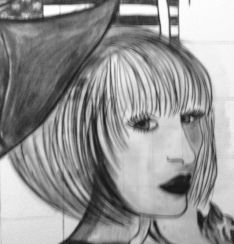
DARFURNICA DAY 11 - JUNE 20, 2009
I had to make some corrections today because the Paris I made two days ago didn't look like Paris at all. So I removed the first try out and started over. It is very different to draw a face that is one square meter compared to a face that fits on an A4 page, but that's also what is fun and challenging about Darfurnica.
The size, theme and content is bigger in every way than anything I have ever made in my life. I just have to take it step by step and hopefully in the end the result will be matching the image I have in my mind.
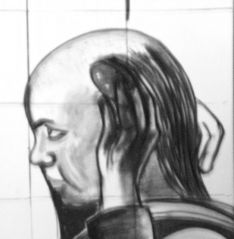
DARFURNICA DAY 10 - JUNE 19, 2009
When Britney Spears shaved her head, the pictures traveled faster than any other news. The press went crazy. Just as crazy as when she was hospitalized. As I was driving to a hospital today I was thinking about the amount of helicopters that circled over her house the night she got picked up by an ambulance because she had some sort of breakdown. The whole world was watching as she was taken away for treatment. The core of the tabloid scene seems like a constant cycle of building stars up only to tear them down – and then build them up as a comeback only to tear them down again. It must be the only way to continue to have “breaking news” about famous people.
The reason I went to the hospital was that I had my last treatment following a traffic accident two years ago. It has been a struggle to get better, but I have been fortunate enough to have a whole team of doctors helping me. The Netherlands is not even my home country and I wasn't insured when the accident happened. But simply because I am a European citizen, I have health care.
In Darfur, the brave doctors and nurses are fighting every day to help the victims. But unfortunately they have to do it without all the required equipment.
Last year I started collecting medical equipment for Darfur, without knowing anything about where to begin or how to ship it there. I started by imagining what equipment they might need. And then I received my first donation from a Danish hospital: 150 pairs of crutches, 20 wheelchairs and five baby hospital beds.. Many of the things would have been thrown out if I didn't pick them up, and they were in great shape. But the hospital simply had too much stuff and not enough room.
I asked the guy who was in charge of the storage room how they could throw it away when there are so many places where it could do so much good. “I would love to help”, he said. “But my job is to keep the storage room and I don't have time to manage sending all these things to new places”.
Obviously I am very very grateful that they wanted to give me the things, but it also worries me that we can't come up with a better system. It seems extreme to me that some countries have enough medical equipment to throw away while others die from lack of help.
Last month I was happy to finally find two receivers in Darfur: the Elfasher Teaching Hospital and the Elfasher Maternity Hospital.
They provided me with a list of things that they need the most, and luckily the things I already had was on the list as well. So now I started contacting more hospitals and showing them the list. The hospitals have been very positive and open to me, and it looks like the first container will be filled up and shipped to Darfur within a very short time.
I am so exited and I can't wait to show all of you who supported my Darfur campaigns that we made something good happen together.
The hospital I went to in the Netherlands have steady agreement with a hospital in Malawi. Everything usable they don't need is sent there.
It should be obligatory for every hospital to pass on equipment in good shape to help others.

DARFURNICA DAY 9 - JUNE 18, 2009
Today I added a sketch of Paris Hilton to the painting. I decided from the start that her size in Darfurnica should be proportional with the amount of publicity she gets in real life: GIGANTIC!
My Simple Living drawing of the little Darfur boy with the dog and the bag was more than a representation of wealth versus poverty. I was trying to make a caricature of Paris Hilton to show how absurd it is that we are updated constantly with her whereabouts and at the same time it is a struggle to get Darfur the needed publicity.
The huge amount of paparazzi photographers following her around indicates how big the audience is in the receiving end.
To an extent I can understand why people get fascinated with famous people. I also get curious about my favorite artists, filmmakers, writers and musicians. Simply because they create something I admire. But Paris Hilton is never in the media because of her work. So what is it that makes her such an interesting phenomenon?
Could it be the simple fact that she represents POWER because of her wealth?
I would like to share an inspirational quote from one of my favorite books: The Seat Of The Soul, by Gary Zukav:
“Our current understanding of evolution results from the fact that we have evolved until now by exploring physical reality with our five senses. We have been, until now, five-sensory human beings. This path of evolution has allowed us to see the basic principles of the Universe in concrete ways. We see through our five senses that every action is a cause that has an effect, and that every effect has a cause. We see the results of our intentions. We see that rage kills: it takes away breath – the Life force – and it spills blood – the carrier of vitality. We see that kindness nurtures. We see and feel the effects of a snarl and a smile. We experience our ability to process knowledge. We see, for example, that a stick is a tool, and we see the effects of how we choose to use it. The club that kills can drive a stake into the ground to hold a shelter. The spear that takes a life can be used as a lever to ease life's burdens. The knife that cuts flesh can be used to cut cloth. The hand that build bombs can be used to build schools. The minds that coordinate the activities of violence can coordinate the activities of cooperation.
We see that the activities of life are infused with reverence, they come alive with meaning and purpose. We see that when reverence is lacking from life's activities, the result is cruelty, violence and loneliness. The physical arena is a magnificent learning environment. It is a school within which, through experimentation, we come to understand what causes us to expand and what causes us to contract, what causes us to grow and what causes us to shrivel, what nourishes our souls and what depletes them, what works and what does not.
When the physical environment is seen only from the five-sensory point of view, physical survival appears to be the fundamental criterion of evolution because no other kind of evolution is detectable. It is from this point of view that “survival of the fittest” appears synonymous with evolution, and physical dominance appears to characterize advanced evolution.
When perception of the physical world is limited to the five-sensory modality, the basis of life in the physical arena becomes fear. Power to control the environment, and those within the environment appears to be essential.
The need for physical dominance produces a type of competition that affects every aspect of our lives. It affects relationships between lovers and between superpowers, between siblings and between races, between classes and between sexes. It disrupts the natural harmony between nations and between friends. The same energy that sent warships to the Persian Gulf sent soldiers to Vietnam and Crusaders to Palestine. The energy that separated the family of Romeo from the family of Juliet is the same energy that separates the racial family of the black husband from the racial family of the white wife. The energy that set Lee Harvey Oswald against John Kennedy is the same energy that set Cain against Abel. Brothers and sisters quarrel for the same reason that corporations quarrel – they seek power over one another.
The power to control the environment, and those within it, is power over what can be felt, smelled, tasted, heard or seen. This type of power is external power. External power can be acquired or lost, as in the stock market or an election. It can be bought or stolen, transferred or inherited. It is thought of as something that can be gotten from someone else, or somewhere else. One person's gain of external power is perceived as another person's loss.
The result of seeing power as external is violence and destruction. All of our institutions – social, economic and political – reflect our understanding of power as external.
Families, like cultures, are patriarchal or matriarchal. One person “wears the pants”. Children learn this early and it shapes their lives. (...)
Money is a symbol of external power. Those who have the most money have the most ability to control their environment and those within it, while those who have the least money have the least ability to control their environment and those in it. Money is acquired, lost, stolen, inherited and fought for. Education, social status, fame, and things that are owned, if we derive a sense of increased security from them, are symbols of external power. Anything we fear to lose – a home, a car, an attractive body, an agile mind, a deep belief – is a symbol of external power. What we fear is an increase in our vulnerability. This results from seeing power as external.
When power is seen as external, the hierarchies of our social, economic and political structures, as well as the hierarchies of the Universe, appear as indicators of who has power and who does not. Those at the top appear to have the most power and, therefore, to be the most valuable and the least vulnerable. Those at the bottom appear to be the least powerful, and, therefore, to be the least valuable and the most vulnerable. From this perception, the general is more valuable than the private, the executive is more valuable than the chauffeur, the doctor is more valuable than the receptionist, the parent is more valuable than the child (...).
Competition for external power lies at the heart of all violence. The secondary gain behind ideological conflicts, such as capitalism versus communism, and religious conflicts, such as Irish Catholic versus Irish Protestant, and geographical conflicts, such as Jew versus Arab, and familial and marital conflicts, is external power.
The perception of power as external splinters the psyche, whether it is the psyche of the individual, the community, the nation, or the world. There is no difference between acute schizophrenia and a world at war. There is no difference between the agony of a splintered soul and the agony of a splintered nation”.
It is so true what Mahatma Gandhi said:
“Earth provides enough to satisfy every man's need, but not every man's greed."
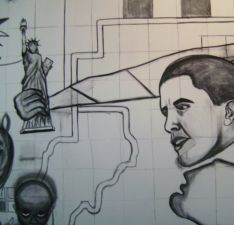
DARFURNICA DAY 8 - JUNE 17, 2009
I am sure, that if anyone has the power to help Darfur, it is Barack Obama. Today I portrayed him in Darfurnica, coming to the rescue. I believe in my heart that he will do as he promised in his election campaign, but we must remind him to act now. In 2007 Barack Obama answered the Save Darfur Coalition's questions about his plan to end the genocide in Darfur. Now, as president, he has the power to live up to his promises and he must turn words into action and release a plan for peace. When Sudan expelled 13 aid agencies after the International Criminal Court issued a warrant for the arrest of President Omar al-Bashir for his war crimes, President Obama said: "It is not acceptable to put that many people's lives at risk. We need to be able to get those humanitarian organizations back on the ground." Two months ago, President Obama delivered a moving speech for the Holocaust Day of Remembrance - a speech where he spoke about his commitment to end the genocide in Darfur. But time is passing by and each day has horrible consequences for even more people in Darfur. Today I co-signed a letter to President Obama made by the Save Darfur Coalition. It went like this: “During the transition, Save Darfur activists like me urged you to develop and faithfully implement a strategic plan to bring the conflict in Darfur to a close and help build peace throughout Sudan. While we were glad to see you begin creating such a plan earlier this year, it is now time for you to personally and publicly unveil that plan and do the hard work of transforming it from words on paper to reality on the ground in Darfur and Sudan. The people of Darfur cannot wait any longer. Every day, millions struggle to get by in makeshift refugee camps, and the coming rainy season will present even more hardships. Sudanese President Bashir's expulsion of 13 humanitarian aid groups means the people in these camps have even more limited access to vital services as the rainy season rolls in. Right now, President Bashir is betting that there will be no consequences for his actions, and he is growing bolder every day. President Obama, you must build the international support for tough diplomatic and economic consequences necessary to prove Bashir wrong, and you should start by personally announcing your plan and making it clear in Washington, in Sudan, and across the globe that your plan will be backed by the full weight and resources of the U.S. government. Mr. President, I know you are committed to ending the atrocities in Sudan, but we need more than a promise - we need action. We need you to personally roll out your plan for Sudan now, and then we need you to make that plan a reality”. Using the following link, you can add your voice as well and send a postcard urging President Obama bring peace to Darfur.
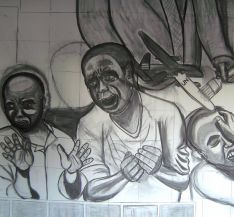
DARFURNICA DAY 7 - JUNE 16, 2009
Children in despair is one of the cruel consequences of the genocide in Darfur and today I added three little boys to the painting.
In the book “The Translator: A Tribesman's Memoir of Darfur”, I read an amazing story about some brave children in Darfur.
The Janjaweed militia abduct and rape the girls and women and they recruit the boys as child soldiers. The boys are dressed in military uniforms and provided with guns. If they don't do as they're told they are killed.
And even though these boys must be so traumatized by their experiences and scared to be killed themselves, many people have witnessed how some of them still tried to get out of the situation. As the Janjaweed jeeps came driving in to new villages aiming to kill the people and burn everything down, the boys ran into the houses to find normal clothes they could change to. Then they looked like the rest of the people in the village and they would run for their lives. Risking of course, to be shot or killed with a machete, but avoiding to kill their own people.
I am completely amazed by this brave and creative attempt to get out of a hopeless situation.
Over one million children in Darfur have lost their homes and are currently living in refugee camps in Sudan and Chad.
I can't imagine anyone who wouldn't run to the rescue if there was a child outside their front door needing immediate help, so why is it OK not to react at all just because it is happening in Darfur?
They are still children AND EVERY CHILD HAS THE RIGHT TO BE PROTECTED.
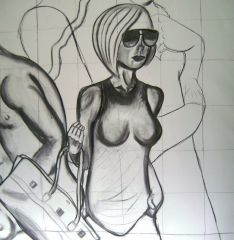
DARFURNICA DAY 6 - JUNE 15, 2009
Today I added Victoria Beckham to the painting. When speaking about the media today, there is no way of getting around it without including Hollywood celebrities. It seems like the difference between "glossy news" and regular news has vanished, and latest stories about popular stars are printed in the serious medias.
It has gone from interviews with movie stars or musicians about their latest work to personal stories, nasty details and preferably with explicit revealing photos in full color. When Britney Spears was hospitalized atleast five helicopters were circeling around her house to get the first photos.
It is completely insane.
When I started my Simple Living campaign with my drawing of a Darfur child holding a designer bag and a small dog dressed in pink, it was to make an experiment to see if it was possible to get Darfur back in the media if one of the victims was “pimped” as one of the stars from the front covers. It worked. And obviously it worked even better because I was sued by Louis Vuitton for copyright infringement regarding the bag in the drawing.
The story got massive media attention and I was happy to start the debate I felt was needed. The amount of feedback was also overwhelming, I received many comments and people told me that the drawing represented something that they felt already but did not know how to express.
But it is a fact that my legal battle was a great story because the journalists could mention “Louis Vuitton” and “Paris Hilton” when writing about Darfur. When I chose to stop selling the t-shirts and started a new Darfur campaign it was difficult to get the different medias to bring an update, and the journalists were very honest about why: “If we can't mention Louis Vuitton anymore, the story won't sell”.
So the people in Darfur need a way to become a “story that sells” since the fact that they are being killed apparently is not enough in itself. We, the audience, want to be entertained constantly.
I personally think that real news and entertainment should be divided and that the serious medias should deal with serious matters.
It is unacceptable if we pretend in the rich part of the world that the “bad” things aren't happening and just report to each other about Paris's latest dog or Britney's new haircut when there are so many matters that are more important.
In the Netherlands, where I live, the most famous celebrity couple broke up about a week ago. The media went completely crazy but the shocking part was that even the Dutch PRIME MINISTER was asked about the break at his weekly press conference, and he responded! He said that he was very surprised to hear about the break up and he thought it was “very sad”.
I couldn't believe my own eyes when I saw it in the evening news.
The love life of celebrities is not and should not be something for prime ministers to deal with.
I think that situations like the one in Darfur are things worth asking a prime minister about EVERY WEEK on a press conference until suggestions for solutions start coming.
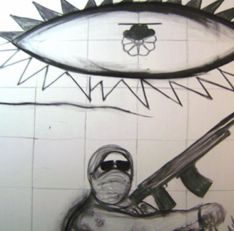
DARFURNICA DAY 5 - JUNE 14, 2009
In Guernica, a single lightbulb is shedding light on the horrors of the bombings. In Darfurnica, the light comes from PetroChina's logo as the company largely is funding the ongoing genocide. In January this year, the Huffington Post reported: “It's expensive to wage genocide. Weapons need to be bought, contract killers must be paid. However, for the genocidal regime in Sudan, expense is not a problem. The government controls the country's oil resources, a valuable commodity in the global marketplace. As Sudan's President Omar al-Bashir boasted, "Just when some countries gave us sanctions, God gave us oil." The regime is further emboldened thanks to the silent complicity of its largest partner in the exploitation of its oil resources, PetroChina/CNPC. This Chinese oil company is more than happy to turn a blind eye to the fact that it is largely funding the Government of Sudan's six-year reign of terror over its own people in its Darfur region. “Clearly, if the senior executives of PetroChina/CNPC, which is controlled by the Chinese government, expressed concerns about the genocide to its partners, Omar al-Bashir and the National Congress Party, they could have a significant impact on the lives of the innocent victims of Darfur. The government of Sudan has a well documented history of susceptibility to economic pressure. However, in spite of tremendous international outcry directed at the company, including divestment actions by 27 US states, 61 colleges and universities, Members of the European Parliament's pension fund, and PGGM, one of the largest public pension funds in Europe, PetroChina/CNPC has not lifted a finger to use its influence to help the desperately suffering people of Darfur. Instead, PetroChina/CNPC has been taking disingenuous steps to improve the public perception of its track record on corporate social responsibility”. On January 7 this year, a group of over 80 civil society organizations led by Investors Against Genocide and Centre for Research on Multinational Corporations issued an open letter supporting a formal complaint to the UN Global Compact about PetroChina/CNPC. The complaint, which was submitted according to the UNGC's Integrity Measures asks the UNGC to use its "good offices" to influence PetroChina to do the right thing in the face of genocide. Oil always plays one of the leading roles whenever something terrible is going on. Oil is money, money is power and in the end greed beats social responsibility. We have seen it before and we will see it again. The thing that is most frustrating is that it happens in the open. It is no secret what is going on yet the surrounding world accepts it silently. China has shown resistance to U.N. Security Council resolutions condemning Khartoum due to its oil ties to the Sudanese regime. As Foreign Policy wrote it: “China’s multibillion dollar investments in Sudan’s petroleum industry are a much-needed source of energy for its mushrooming economy. Beijing may make tactical moves to pressure Sudan, but it will not choose human rights over oil, a matter of paramount national interest”. Ending the Darfur conflict requires much more than what China alone can offer. However, it would be a great start if Chinese President Hu Jintao would choose to put financial pressure on al-Bashir to cooperate with the UN. I received a comment from a man who suggested that it should be a part of Darfurnica how President Hu Jintao as well as leaders from surrounding countries are turning the blind eye to the situation in Darfur and I think he is right. I will put it in the painting.

DARFURNICA DAY 4 - JUNE 13, 2009
Today I started working on a sketch of Sudan's President, Omar Hassan al-Bashir. Yesterday it was four months ago that the International Criminal Court issued his arrest warrant. He was charged with war crimes and crimes against humanity in Darfur. President Omar al-Bashir's government responded by expelling 13 humanitarian groups from Darfur and seizing their assets, threatening lifesaving operations, a U.N. spokeswoman said. The Huffington Post reported that “In the Sudanese capital of Khartoum, the government denounced the warrant as part of a Western conspiracy aimed at destabilizing the vast oil-rich nation south of Egypt. "There will be no recognition of or dealing with the white man's court, which has no mandate in Sudan or against any of its people," the Information Ministry said. Al-Bashir, who denies the accusations, drove through the capital after the warrant was announced, waving at crowds. So far, al-Bashir has shown no remorse what so ever about the situation in Darfur and continues his horrifying atrocities. In Darfurnica I will portray him painting bombers to disguise them as UN planes. In April 2007 The Times published an article based on a report from the United Nations. “The report’s most astonishing revelation was the use by the Sudanese armed forces of white-painted military aircraft in Darfur. On March 7 (2007) a photograph was taken of an Antonov AN26 aircraft on the military apron of al-Fasher airport, the Darfuri regional capital. Guarded by soldiers and with bombs piled alongside, the plane was painted white and had the initials “UN” stenciled on its upper left wing. Another Sudanese military aircraft was disguised in the same manner. The report said that white Antonovs were used to bombard Darfur villages on at least three occasions in January 2007. A similar ploy was employed to conceal the identity of three Mi171 military helicopters which were painted white. The report said that from a distance the aircraft could be mistaken for similar helicopters operated by the UN and peacekeepers.” Imagine the Darfuris seeing the planes coming, thinking it is the United Nations, only to realize that it is bombers... It is psychotic how creative human beings can be when it comes to killing each other.
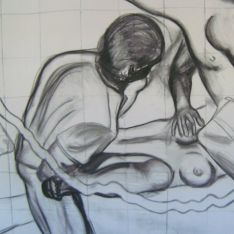
DARFURNICA DAY 3 - JUNE 12, 2009
If Anne Frank was still alive, she would have turned 80 today. I wonder what she would have written in her journal about Darfur. Today it is also exactly half a year ago that I met some women from Darfur for the first time. I was in Paris to make an art piece for the Emergency Room exhibition in Galerie Taiss and my work was a gigantic bag-sculpture, titled Darfuitton. The night before the event would take place, we made some last minute calls to see if there was any Darfur-refugees in Paris who would want to participate. Amazingly, the helping organization Urgence Darfour agreed to come and help and they invited refugees from Darfur as well. 12 hours later we were standing together in the gallery. I explained my work with Darfur and my thoughts behind the sculpture and they helped me paint it. The women asked me if it was OK that they wrote some sentences on the bag about their experiences in Darfur and of course it only made the work stronger. As we finished, one of the women came up to me and said: “If you make more art works about Darfur, please make something about the rapes. There are so many rapes.” She was a tiny woman with beautiful eyes and it struck me how calm she looked. She told me about things she experienced in Sudan before she was lucky enough to get out of the country. It was absolutely horrifying and I asked her, “With all these painful memories, how can you stand here smiling like this”? And she said: “Of course I am smiling, I am still alive”. I promised her that I would involve the rapes in a future art work and today I added a rape to my painting. According to the Washington Post, a report on the crisis in Darfur has identified rape as a systematic weapon of ethnic cleansing used by the Janjaweed. The report, “Laws Without Justice: An Assesment of Sudanes Laws Affecting Survivors of Rape,” by the humanitarian group Refugees International, said: “The raping of Darfuri women is not sporadic or random, but is inexorably linked to the systematic destruction of their communities”. “For a woman to prove rape under Sudanese law, she needs four male witnesses. This requirement puts undue burdens on women in a traditional society where single women having sex can be sentenced to 100 lashes at the discretion of a judge. A married woman proven to have had sex outside of her marriage can be stoned to death”, said Adrienne Fricke, an Arabic-speaking lawyer who worked on the report. A group of doctors and Psychologists working for an aid group supported by Havard University interviewed many Sudanese women in refugee camps in Darfur and Chad. The rapes usually happen when the women have to leave the refugee camps to collect wood. 88% of the women stated that they were living in constant fear of being raped. In most cases the rapes are not even reported because the women fear the social consequences. Today was also the day where a radio channel brought the breaking news: Paris Hilton and her latest boyfriend broke up.
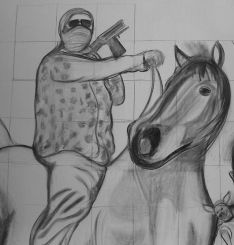
DARFURNICA DAY 2 - JUNE 11, 2009
Today I added a Janjaweed to my painting. The word means "a man with a gun on a horse". I always found the horse in Guernica very powerful and when I first started thinking about a possible Darfurnica, it felt obvious to portray the government-backed militiamen as one of the center pieces in the work. Since the crisis in Darfur started in 2003, the Janjaweed militiamen has killed numerous African people, forced them out of their villages and raped the women. They have been accused of some of the worst human rights violations. In 2008, Sudan's president Omar Hassan al-Bashir promoted Musa Hilal, a suspected leader of the Janjaweed, to a senior adviser post in the government. Many human rights groups protested, but President Al Bashir was quoted as saying, "Musa Hilal contributed greatly to stability and security in the region". There are many reports from international aid workers maintaining that Janjaweed raids are backed up with bombardments by the Sudanese air force and that Janjaweed militiamen wear combat outfits similar to those of the regular army. According to Sudan researcher Alex de Waal, an official statement from Sheikh Musa Hilal's headquarters in 2004 demanded the militias to "change the demography of Darfur and empty it of African tribes". So when people still argue that the situation in Darfur isn't genocide but civil war, I feel like asking them: How fair is a war where one side is provided with guns and helicopters by the government, and the other side has sticks to defend themselves with and nowhere to hide? I read an interview with a refugee from Darfur who lost his 4-year old daughter when his village was attacked by the Janjaweed. She was killed in front of him by one of the militias who stabbed her with his machete and then paraded around the village on his horse, with the little girl still hanging on top of the machete. The father explained how this exact image of his daughter was all he had in his head. Since I read about it, the image has also stayed in my head.
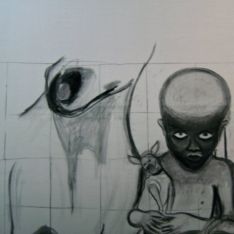
DARFURNICA DAY 1 - JUNE 10, 2009
Today I started working on Darfurnica. It feels overwhelming to start working on a canvas this big, like you're almost in it. I have imagined for a long time now what it would be like to work with and what the outcome will be, but it was still different to stand so close to it and touch it with my hands.
I started with sketching up my Simple Living boy because I decided last summer that he would live on in this painting. When I made the drawing of him two years ago I never imagined how much he would influence my life and my work. By now, I feel like I know him quite well. He has been the starting point of my work with Darfur and he was the first step towards my own attempt to stand up for the people in Darfur.
When I started working with Darfur as a subject, the genocide had already been going on for 4 years. I had heard about it here and there in the news, not much, and one day I noticed that the latest development in Darfur had gotten 4 lines and Paris Hilton's trip to prison got the front page. Basically, it could have been something else than Darfur. It could have been Rwanda 15 years ago. It could also have been another celebrity.
The turning point for me was that I realized in that second, how absurd it is that I, by coincidence, was born in a part of the world where I never have to deal with problems like genocide. I could have lived my life without never knowing the first thing about the genocide in Darfur. I could have read only the glossy "news". I could have flipped the page or zapped away or changed the subject. I could have chosen just not to care about it. And what bothered me the most was: No one would expect me to.
It had never hit me like this before and I decided in that second that I would care. I would care because the people in Darfur are PEOPLE. They are not the statistics which are used to report about the crisis in a less personal way. They are more than the "400,000 dead". They are 400,000 dead mothers and fathers and sons and daughters and grandparents and I know for sure that if I was in their situation I would want someone to come to the rescue.
Sure there are some helping organizations in Darfur doing an amazing job by trying to pick up the pieces. But when did the rest of us get to a point where we decided that it was OK to just leave it all up to other people? That we could pretend our world is a wonderful place inside a small glass ball with no real connection to the horrific stories we hear now and then?
I decided I would make it my own personal mission to end the genocide in Darfur. And if that sounds a bit too confident it is because my theory is: if you act like it IS your sole responsibility to do something, you can get quite far. And since I am an artist, I am using my art. I have made drawings, sculptures and events. I have sold t-shirts, been sued and collected hospital equipment. And now I am going to make a painting. About everything I have learned in the past two years.
Whenever I tell people about my work, 80% respond:WHAT DOES DARFUR HAVE TO DO WITH US?
And it is exactly that attitude that inspired me for this painting.